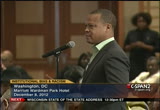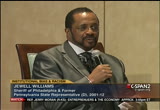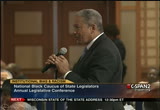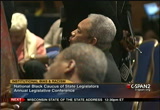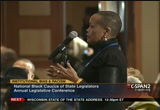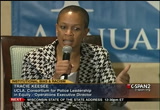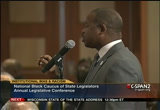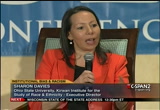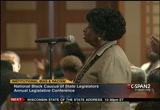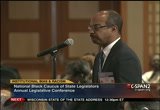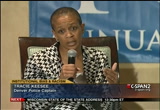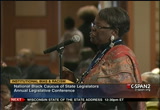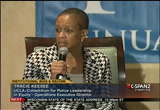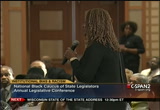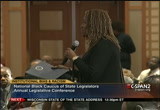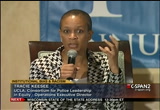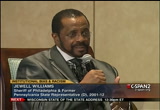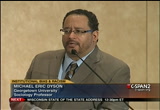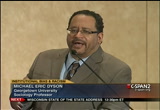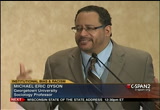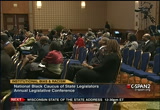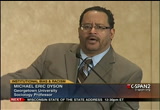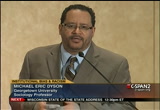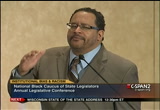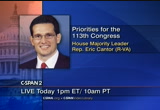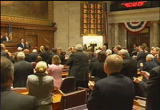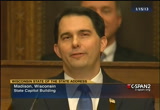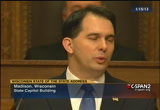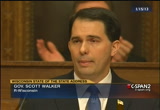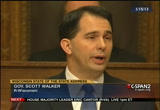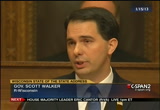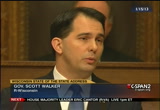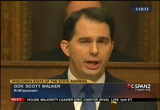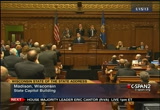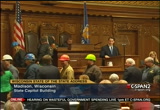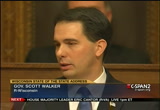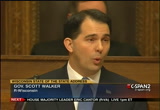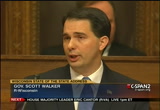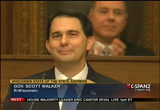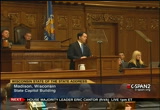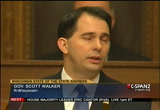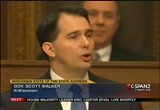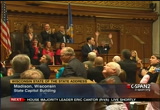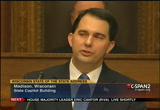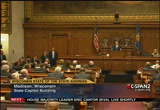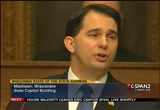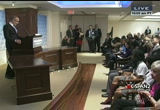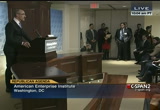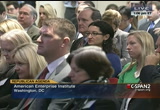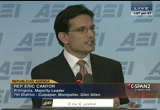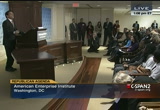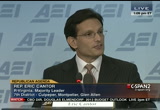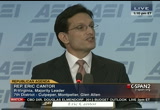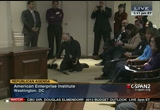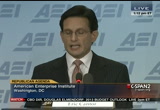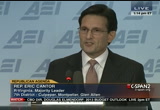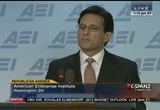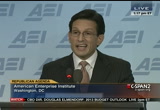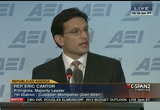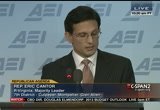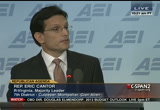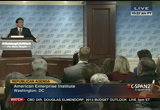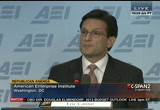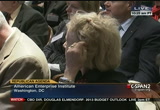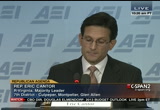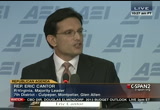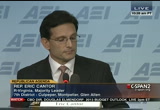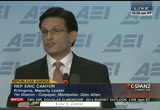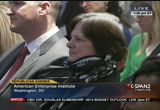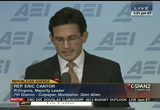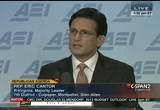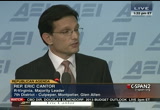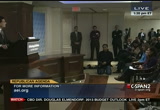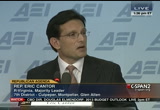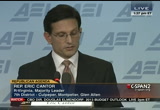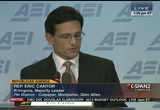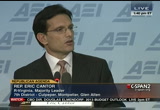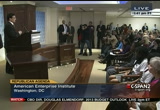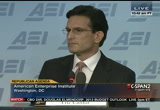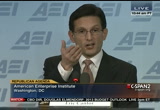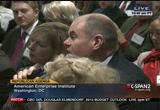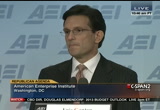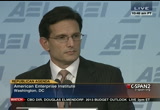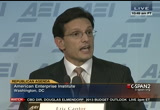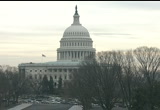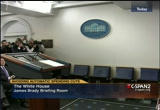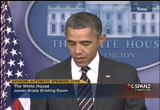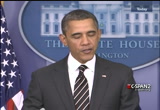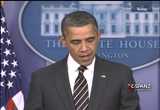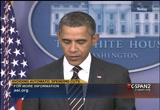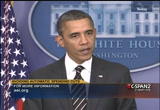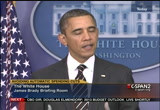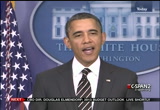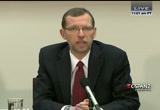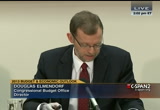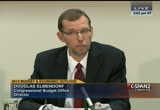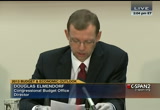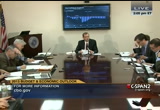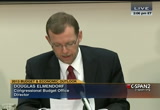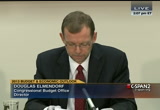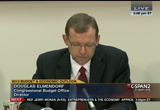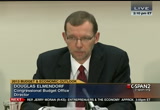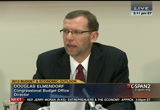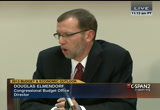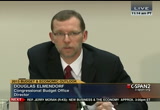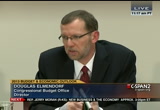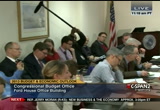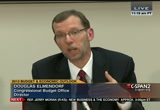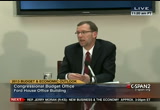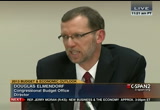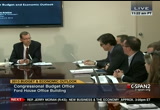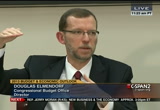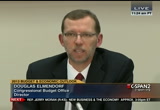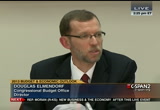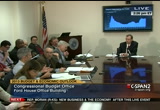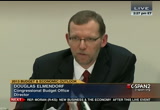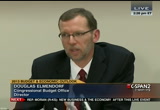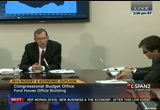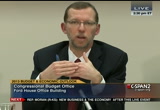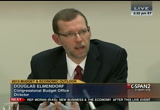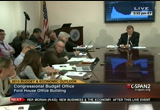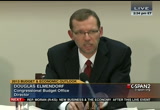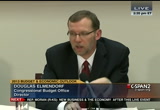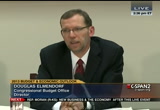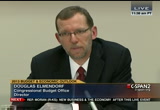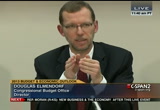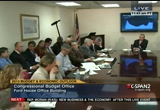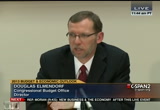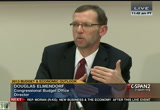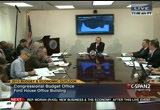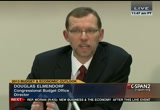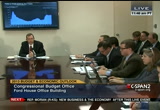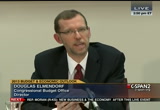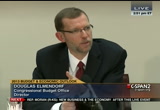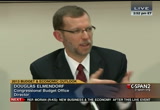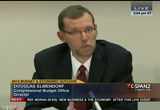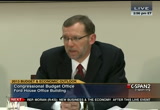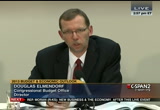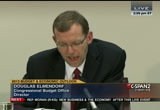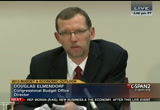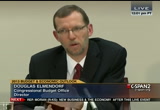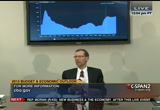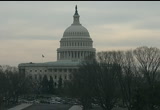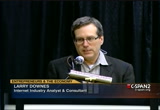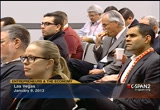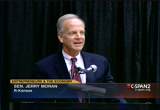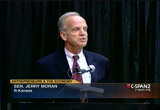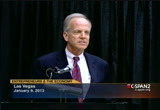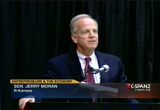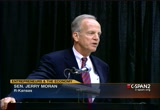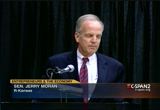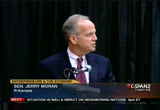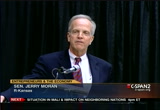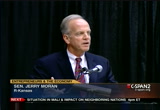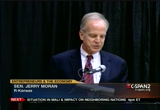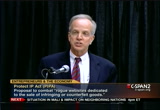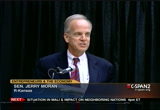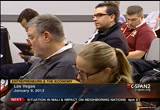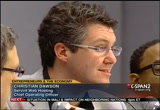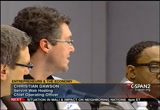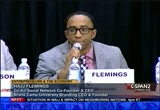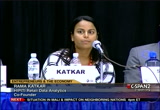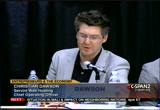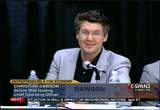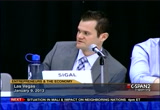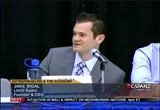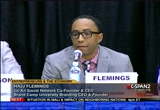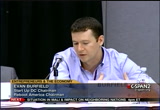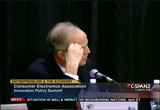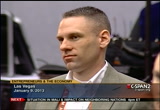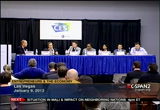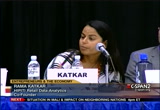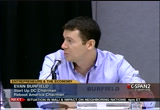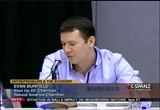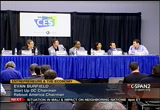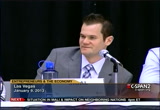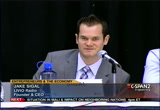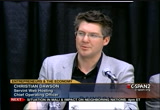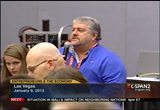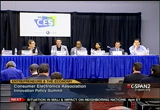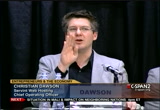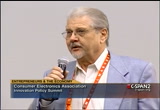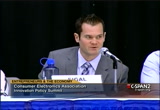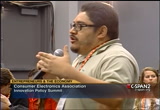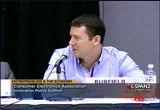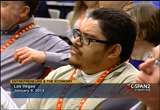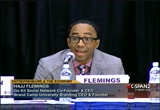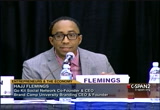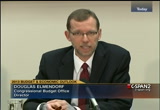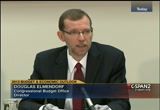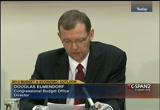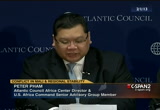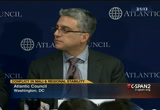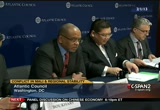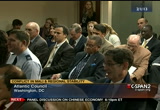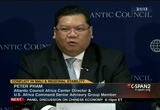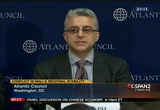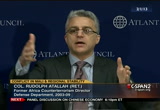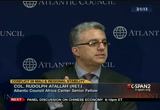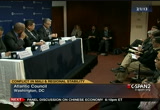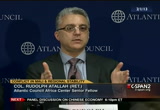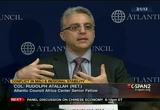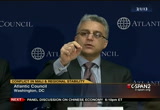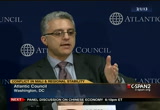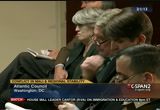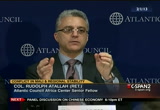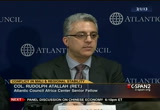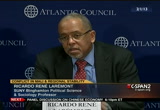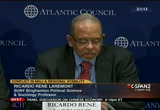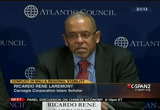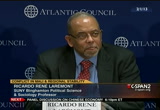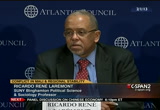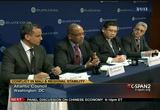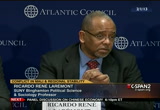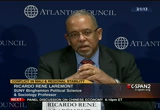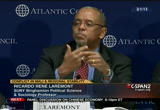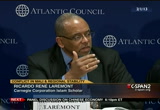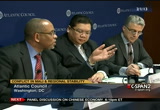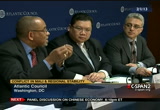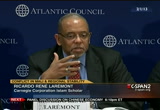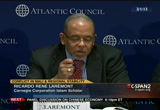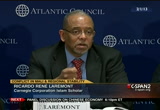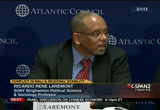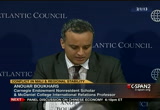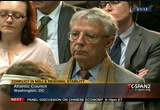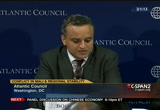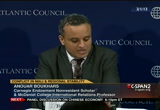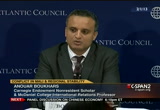tv U.S. Senate CSPAN February 5, 2013 12:00pm-5:00pm EST
12:00 pm
implicit bias and help shift with them from being on the defensive of the legislation that really decriminalizes a number of nonviolent offenses that come with mandatory sentencing, for example. so how do we deal with that? how do we talk to the counterparts that want to do the right thing but they say we know some populations are going to benefit directly from this. >> as a former legislature i wouldn't negotiate during the time of budget. we know when the other side of the ogle wants to get their money or they want to get some projects past year should have that list of things you want to get done for your people and that is a sign that the negotiation is done on budget time. you use the opportunity to get
12:01 pm
what you want into the negotiation around budget time. >> what about the negro's? there is the negro factor. >> representative miller of memphis tennessee to get my questions are on the same line as the last speaker. when we talk about implicit racism and or by as institutionalized, the first place we should look at is our federal government, the largest governmental institutions and as some would say the most powerful institution, government institution in the world, but we can have the majority leader of the senate to say after the 2008 election our progress for the next four years is to defeat the
12:02 pm
president of the united states. i don't think that was fair based on the difference and the parties. however, the question is where do we begin with trying to change that meant devotee and attitude of the bias? >> not being a legislator i don't know that i have as much background as the brother to my right. i would simply say that there are two freds you could build on the republicans like they are have come to the point where they give lip service to endorsing the civil rights movement and one in racial equality and even on honoring dr. martin luther king. i would say use the language they are putting out as a way to engage the conversation. and i would say tie it on to the second threat of duces we are not accusing you of being bad
12:03 pm
people. at least you could say that to them. you could allow the conversation and not have to feel like they are racist which is how they have been in the past because we know the way that the implicit bias plays out is not because of conscious and ms towards a particular garbus people but because of the association to automatically happen in our brain. >> thank you so much for reminding us that we need to create the space to talk about this. i appreciate that. but working at the institute on the race and ethnicity in the university of little rock one of the things we are considering the next upcoming session is racial impact. i just wanted to get your thoughts on whether or not you think that is an effective way to go to get to these issues and
12:04 pm
if so some resources i would consider the ways to be effective and carrying out that kind of legislation. >> racial impact statements are known to be very beneficial, but the question you have to ask is what is the goal because they can have the opposite effect where you are trying to open the space for the communication and they can shut it down pretty quickly because typically the statements are very emotional and very painful, and so i will give you my card but i would suggest you do if you want to do that that those are done in smaller settings, and with individual communities and not as a statewide kind of thing. that way you start planting the seed and they start to go well and others will go well because you can easily shut down which have the room will relate to and the other half will shut down.
12:05 pm
>> kevin mathews from oklahoma. my question is to ms. davies. the question on the type one and tied to thinking and the way that we are influenced in the fact that we have the implicit bias, when we use the tight to thinking and the rationale, has your research shown that that actually makes a difference in the way people will act and specifically when we talking about voting, these things to their stated value as we said before, the stated values of having a safe republic and costing less when we cater to that type of thinking has your research show that is effective in making the change or do we know that's the way people
12:06 pm
think? >> it can make a difference if it is informed, if it is informed and a local thinking. but a lot of thinking that we do, we think of as rationale that it's actually quite irrational. so it depends on whether a police officer who is engaged in a particular police practice, for example, understand the way that practice operates structurally, and also the officer may be susceptible to implicit bias when engaged in that practice and so he might be thinking about that quite deliberately. but unless he understands the implicit bias it may not stop the disproportional body of the policing in a particular neighborhood. but i do think that it's important when we understand how
12:07 pm
the structural mechanisms operate to create the disparities that we respond to the structural mechanisms with other structural mechanisms. as a, one example of the racial impact analysis could be a structural mechanism that helps us collect the data that sometimes we don't even bother to collect so i do think to institute structural mechanisms in response to others is a very important part of this. >> from memphis tennessee state representative first i want to commend you for an outstanding presentation this morning. [applause] i would recommend seen simply this repeatedly until everybody has seen at because it is
12:08 pm
outstanding. i am a legislator and i agree with the comment. i agree with everything you've said that the most enlivening but i wish that there had been more because now the new enemy in some sense is the black african american legislators who acquiesce to the leadership so that they can get some of their precious bill passed by compromising their principles and our people. but recommendation would you give? [laughter] >> thank you. as a former member legislator in the politics is all in how you negotiate. i would say this organization is
12:09 pm
a springboard to date and if you can never get the corporate roundtable to impact that person in the and response of negro 2012 that you could ever get your sponsors for the people who finance them on board than you can make that person a better politician or legislator. >> i would like to thank the panel, i'm from kansas, good to see my colleague and i would like to thank each of you for your insight. as a former county prosecutor, i -- and one that has been a legislature for 18 years, i've worked with our president and the senator and representative hendrickson from kansas to try to ensure that racial profiling is banned.
12:10 pm
it's been to chip away time and again at the different parts and go through a series. we want you to form the data collection at least as the cornerstone peace and was said by the panel that even when we get the data that shows all the stops, these pretentious stops are in fact not being recorded, why was that on the national basis or how was that data not able to drill down and find those bad apples because all the cops are not bad we are using that as a gateway why doesn't work nationally and why is the data not available so that we can address the racial profiling? >> one of the reasons, there are multiples actually, it depends on the data that you are collecting. from a general statement, when you introduce to a police
12:11 pm
organization you're going to start collecting the data, then the negotiation begins. the union will step in and say we are going to do this and you can't identify the police officer or you can't say something that identifies the officer will agree to this under the circumstances. so, you have the pieces of data missing. that is one of the reasons. the other is there isn't a general consensus on what constitutes the racial profiling. the experiences are different and so i don't think you need to narrow down the one definition and say this is it, but i do think there is room to say in these areas this is what we are talking about. so it is sitting down and understanding that to get to the information you need, what data do you need up front not wavering on the data that you need up front because typically and hysterically we will give you all the following things. that's all the stuff that you
12:12 pm
would want now and there are ways to do that where the officer remains anonymous but you can turn over to the chief and share of and say you have a problem here and you need to figure out how you want to go about that. so a lot of it is at the data that you are collecting and then who's doing the analysis of the data. that is the other piece as well. we are all complicity in that saying there is nothing wrong and if there is you have a problem. >> thank you. idf a data question as well. i was intrigued by your point about how many years we have been collecting data on the racial profiling and stopping in the state of south carolina we thought we had done something when we got the bill passed only to have our state law enforcement division tell us there is no issue. how do we proceed on this notion of a national clearing house that would involve analysis all of us could use across the country to make sure that when
12:13 pm
we pass legislation the efficacy is something that we can have a in-house analysis so i am intrigued by the notion of a national clearing house and i would like you to speak how we might be able to get that done. >> thank you in the 12 step program the first step is you have to deal to identify and accept the there is a problem and so that to me is in its infancy stage and something that has to be done not just with law enforcement but all the way around. the other part of that is as much power as they do and don't have on if you smoke marijuana or not, got that on c-span but i digress. so a lot of it is what is large federal in place mechanisms
12:14 pm
willing to help broaden that conversation because we can't collect anything if we say it isn't happening. if they are involved and have to understand what we are talking about and understand that we are not pointing fingers and saying that it's you. the other part is there has to be large support that says we want to get to the bottom of this answer and to do this not just in your state but in colorado it would help us on this kind of national organizational conversation about race and it's something we all share and would be helpful ..
12:15 pm
and i recognize that when i walk on the floor of the california assembly as a six-foot tall black woman with dreadlocks the bias is not merely implicit, it is tangible and it is in my face. but my presence there changes the course of the conversation. so we have to recognize our power and make sure that we're serving on the public
12:16 pm
safety committees and we're in the room at the table so we could have the power to change the dynamic of those conversations. we have attempted to do that in california. one of my colleagues in the black caucus on the northern section of the state created a select committee on boys and men of color. we held hearings across the state, opening them up, inviting men and boys of color, to come before their legislators, primarily black and brown men who serve on the select committee to talk about their life experience. what occurred listening to the panel, i don't know we've spent enough time with law enforcement at same table being forced if you will to respond to real time to the reality of the lives of meese men and boys of color. my question to the entire panel, are there other committees of this sort you see in other parts of the country? >> i wouldn't say they were necessarily formal committees but we've seen
12:17 pm
them at a community level where the community decided there is something that needs to be done the agree with you to have law enforcement on the table. there is reluctance about making the phone call because you don't know what is going to happen. so, for example, what we've done in denver we call them listening tours. you bring in law enforcement. they're not in unrecall to the they're in civilian clothes. we have panels of young people who talk about their experiences and one of the things and one of the instructions that i give to the officers is, you're here to listen, not to defend but to listen. when this is all said and done, you need to listen some more. it is not about defending someone's actions or do you understand. it is listening. for a lot of us, even not police officers that is hard to do because you're already form lating to the response to what they're saying and you're defensive. it works that way and when you're bringing law enforcement to the table, for me, it works in most states not to turn it into 150 and have the officers
12:18 pm
sitting up here getting berated that would shut anybody done. but get them into their small neighborhood and communities and listen to what folks are saying about their experience. might not have been you but their counterpart the way they treated me or spoke to me. a lot of times we forget, we do. we get caught up in what we're doing. we get caught up going home and we don't think about it. sometimes the reality check is very necessary. >> there is an organization called the national black police officers association. they're a national group and they are partner now with this organization of ledgetors. they just did an amendment to be a part of our working group. but i would encourage you to contact the national organization of black police officers because they are compiling this information. they are working on the data. they're working with states and cities who have filed lawsuits. and the other way to get that information is the result of lawsuits that have been filed, discrimination
12:19 pm
lawsuits. so that is some place you can start. but when you have national organizations who are willing, particularly black police officers, who are willing to step out on the front lines to give you that data and that information, i would encourage you to communicate with them. >> all right. well, this has been an extraordinarily informative panel and you see by the testimony so to speak of these experts that this is a vital and critical problem that we have to confront. and it has real consequences on actually existing people, on flesh and blood folk, most of whom are ours. whether black or latino or asian or indigenous people or the like. the reality is all of this intellectual and academic and cerebrally intense stuff we're talking about has application.
12:20 pm
that's no reason to dislodge the centrality of the academic and the abstract and the theory because the reality is, given what this panel has spoken about, and professor davies in particular in regard to the fast low paradigm introduced by daniel and then, of course professor, mr. harris speaking about the fear and empathy codes and then dr. kazee the way systemic bias is distributed through practical application of law enforcement and of course sheriff williams speaking about ex-sis tensionly being a victim of the that we're theorizing here. that just remind us that that is real stuff. and the thing if you go to the chemistry of bigotry, right, the psychological,
12:21 pm
neurological pathways in the brain that have been laid out, it still depends on social cues to stimulate the biological feedback loop and to, you know, provoke the brain to certain responses. that stuff is still rooted in stuff over which we have control to the degree that we point it out, we acknowledge it and then we confront it. and we know how difficult it is to change and challenge our own biases. just ask black folk who are baptist about gay people. that's another panel. right? that's another panel. but i'm asking you to do that to empathize with folk who got to confront their bias, right? i ain't never been to no black church that don't take no gay tithes. they will exploit the very people they point to and target as useful recipients
12:22 pm
of their bigotry. so now you bring in god in to justifying cosign your bias. now same thing happens in racial hierarchy. people bringing in. it wasn't the fast thought withs that messed up. it was the slow thought that got us screwed up. emanuel conn david hume. philosophical predicate for the extension of white supremacy as an ideal to negotiate the tensions in civic and social culture as professor davies pointed to, that slow thought, that analytical thought, was itself infused with such tremendous bias that it perpetuated a legacy of inequity. so now we have got to figure out the ways which we can challenge that pro within and, as mr. harris has reminded us we're not trying to tell white folk irthe bad person and you're horrible and so on so forth but it is
12:23 pm
interesting to me that a society teach us to be responsible don't never want to be responsible, right? pull yourself up by your boot straps. face yourself in the mirror and confront your own limitation it says. yet when we point and say, can we share that, all of a sudden, you people never can be satisfied. never can be -- you know, resolved in your own minds about this and yet when we point to a more scientific, if you will, more critically analytical framework that allows us to talk about implicit bias and that frees us from fingerpointing, but collectively engages us to say, hey, all of us have to confront our bias and are we all willing to do so around our young people? that's why i said about the that. some of us perpetuated legacies of inequity within our own households and our own culture. look at corporal punishment for black folk, another tight issue.
12:24 pm
all of us done brook tis it probably the question is look at the long-term effects. black people say it ain't hurt me. the jury is still out. the jury is still out on that. [laughter] i ain't no law enforcement person but the jury is still out. but the reason we were more invested in corporal punishment because we wanted to control our kids so the system wouldn't murder them, right? let's not act we don't know why. but at the same time how about adaptive personalities. how about adaptive traits? how about evolution of thinking for new times so we can fit the situation? because we ain't had no timeout. we had knockout. timeout was the time you got knocked out and you woke back up, right? so the facing the walls was beautiful [laughing] of. that, that was nonviolent intervention. in behalf of black practices domestically. so, the point is, we've got to face this stuff because it has lethal consequences on our kids.
12:25 pm
not graduating. being shunted to the periphery. kicking our kids out. and you got a whole generation, look at these rappers who speak about it. teachers couldn't reach me and my mama couldn't beat me hard enough to the match the pain of my soul. that ain't just in my membrane. got on my pimp game. the world my defense came that is adjacent see psycho neurobiological analysis of the prevailing ethos in the community where teachers and parents have had a very tangible impact on the human being and what that might mean. so we all know, that this stuff has a tremendous impact. eighth grade trade dropout. biggie doesn't graduate from college. jay-z barely. tupac barely graduate high school. who are the geniuses, them or the schools? educate is not schooling.
12:26 pm
schooling is the institutional matrix, institutional matrix that receives the urge to learn and then distribute it, distributes it culturally. ostensibly based on merit but learn something for a life-style. that's what you do when you figure out your life situation and figure out what to do in regard to how you continue to learn and flute ture and grow your mind over the space of a lifetime. so the point is that we got these institutions that are making judgements about our children and that we are complicit in without stepping up to the plate to intervene. and so i'm so glad you all are doing that with knowledge, with insight, with savvy and also with critical acumen give to you over a lifetime. we need to use this in behalf of our children so that they won't be sent off. because one person gets hit on the back of the hand and told not to do it anymore. drunk until a certain age. then can go on to be president. another person gets
12:27 pm
consigned to being a janitor. both got the same talent. both got the same, if barack obama had been caught doing some stuff he was doing, that he said in his own autobiography that he did, he wouldn't have been the president and the victim of implicit, explicit, subtext wall, above-ground, beneath ground, forms of bias. he is a study in all of it converging simultaneously. everything you want, everything. is right with him, right? [applause] too black. not black enough. right? too much swag, not enough courage. everything you want. every litmus test you can engage but the tragedy is, that, that the man who wrote one of the most brilliant books on race has been muzzled in the white house because of the fear of a dominant culture, of a black president or a president who happens to be black, and the knowledge that he could impart.
12:28 pm
it is like having michael jordan in the white house and can't talk about basketball. well that ain't what i'm supposed to do. i want to thank this panel for their brilliance and their insight and i want to thank you all for continuing to do a great job. [applause] >> coming up live today on the c-span networks, beginning here on c-span2 biel be live at 1:00 eastern for remarks from house majority leader eric cantor. the virginia republican will speak at the american enterprise institute this afternoon. he is expected to talk about his party's priorities for the 113th congress. again that will be live at 1:00 p.m. eastern right here on c-span2. right around the same time, president obama is expected to ask congress to agree to a package of short term spending cuts and tax reforms off the pending sequester cuts. he will come to the cameras at 1:15 eastern. you will see that online at
12:29 pm
c-span.org. more talk about the budget a little bit later today as the head of the congressional budget office, douglas elmendorf will talk about the release of the annual budget and economic outlook. that will be live from cbo headquarters at 2:00 p.m. eastern. we'll have it here on c-span2. also congressman patrick meehan and other house democrats will brief reporters on legislation to combat gun trafficking. that will be live at 2:00 p.m. eastern on our companion network, c-span3. >> the single thing that coolidge did that we want to remember, when he left office, the budget was lower than when he came in. that's the story for us now in a period where we're concerned, well, how did he do that? the economy grew a lot. maybe more than 3% sometimes. unemployment was below 5% the budget was balanced due to his own parsimony. how did i manage to make the budget go lower? how did that help the economy? a lot pause he got the
12:30 pm
government out of the way of the economy. >> amity shlaes tracings the life of the 30th president of the united states, in coolidge on c-span's q&a. >> wisconsin governor scott walker delivered his state of the state address in madison recently where he called on state lawmakers to put forward, a quote, environmentally sound mining bill. he also pushed for a income tax cult for the middle class and job creation. the governor said he was doubling down on his efforts to meet his 2010 campaign promise to create 250,000 private sector jobs over the years. this is about half an hour. [applause]
12:31 pm
12:32 pm
president ellis, majority leader fitzgerald, minority leader larson, minority leader barca, members of the wisconsin supreme court, constitutional officers, tribal leaders, members of my cabinet, distinguished fests, members of the legislature, most importantly good evening to the great fellow citizens of this great state, the state of wisconsin. it is my honor to speak before you tonight. before we get started i would like to introduce the first lady of wisconsin, my wife, tonette, who is up in the gallery. [applause]
12:33 pm
next to it. onette, are our two sons, matt and alex. [applause] they change quick. matt came over from college right after his last class. alex came over as his day at in high school. next to them are my parents, lou and pat walker, who are right there as well. [applause] and right next to them is my brother david, my sister, maria, and the two most beautiful girls in the world here tonight, my nieces isabel and eva. [applause]
12:34 pm
now if i introduce anymore walkers my boys will be upset with missing the kickoff, not the kickoff, the first call in the wisconsin game. i will not introduce anymore of our family. i want to introduce the ad adjutant general, don dunbar. thank him off the 10,000 women in the wisconsin national guard. thank you to him and each of them as well. [applause] ladies and gentlemen, we are moving wisconsin forward with bold vision and bright hope for the future. two years ago when i first stood here as your new governor wisconsin was facing a $3.6 billion budget deficit.
12:35 pm
property taxes had gone up 27% over the previous decade, increasing every year and the unemployment rate was 7.8%. today wisconsin has a $34 million surplus. property taxes on median value home went down each. last two years the unemployment rate, well, it is down to 6.7%. [applause] we're turning things around. we're heading in the right direction. we're moving wisconsin forward. and unlike other states we avoided significant tax increases, massive layoffs and cuts in programs like medicaid. instead we put in place long-term structural reforms that helped us balance state and local government budgets for years to come. what we did was think more about the next generation than we did about the next election and it worked. but the first time in our
12:36 pm
state's history we set machine any aside in two consecutive years for the rainy day fund. our bond rating is solid and our pension system is the only one in the country that is fully funded. [applause] we made tough but prudent decisions to get our fiscal house in order. today, unlike the federal government and many of our neighboring states we have surplus which will allow to us invest in our priorities. with the introduction of my proposed budget next month i will lay out a clear plan for reducing the burden on hard-working families by lowering income taxes on the middle class. [applause]
12:37 pm
we want to continue to put more money in the hands of the hard-working taxpayers and small business owners of this state. unlike the message coming out of washington, i believe that putting more money in the hands of the people instead of the government is good for the economy. helping the people of wisconsin create more jobs is my number one priority. during the three years before i took office our state lost nearly 150,000 jobs. at the low point unemployment topped 9%. soon after taking office i called the legislature into a special session on jobs and we enacted some of the most aggressive plans in the country. today the unemployment rate has dropped to 6.7%. new business ventures are up nearly 11%. and we've changed the opinion of our employers for the better. in 2010 a mere 10% of the
12:38 pm
employers surveyed said that our state was headed in the right direction. in 201293% said wisconsin was heading in the right direction. [applause] over the past two years wisconsin moved up 21 spots on chief executives ranking of the best and worst states for business. cnbc moved us up to 17. site election magazine ranked our state as high as 13. employers feel good about our state. in the past year kohl's department store worked with us and announced the creation of 3,000 new jobs. plexus in nina is adding 35 jobs. alliance laundry systems is adding 270 jobs. big announcements like this are great we're just as excited companies like
12:39 pm
nekwski meat products adding 21 jobs. and premium warters in chip waa falls, adding 21 jobs. small business owners in particular want certainty and we have dramatically improved the business climate in our state. we're turning things around. we're heading in the right direction. we're moving wisconsin forward. [applause] still there's much more work to be done in the coming year. our top priorities is helping the people of our state create more jobs. as you know, we have an ambitious goal. 250,000 jobs by 25th teen. after all that we've gone through in wisconsin over the past few years some have suggested this goal is too difficult to reach. the protests and recalls, combined to slow recovery at the national level, the fiscal cliff and ongoing worries about health care
12:40 pm
mandates coming out of washington, they say there are plenty of reasons why it has been hard to create jobs. but in wisconsin we don't make excuse us. we get results. [applause] with this in mind we're going to double down and be even more aggressive with our efforts to improve the jobs climate in this state. that's what i heard during my listening sessions hell around wisconsin. people want us to focus on things that will improve the economy and our way of life. that's why i laid out five very clear priorities for the next few years. create jobs, develop the workforce, transform education, reform government and invest in our infrastructure. it's also why i have asked the members of this legislature, to stay focused on these same priorities and not get distracted on other
12:41 pm
issues. one of the best ways we can show the people of wisconsin that their state government is focused on jobs is to pass a bill that streamlines the process for safe and environmentally sound mining. [applause] start with the legislation that was approved in the joint finance committee last session. include some reasonable modifications, and send me a bill to sign into law early this year. [applause] [cheers and applause]
12:42 pm
[applause] now a mine would be a life line to people in northwestern wisconsin with the unemployment rate in iron county is the second highest in the state at nearly 12%. but the benefits would be felt all across wisconsin. we have the potential for a billion and a half dollar investment here in our state
12:43 pm
could lead to as many as 3,000 construction related jobs and 2800 long term jobs. it is no wonder i heard from people in places like clinton, wausau, green bay, superior and chippewa falls who want us all to get this bill passed. we need to get started on this project as soon as possible. tonight, please join me well many coulding a number of people who want to get to work. joining me are josh guinness, larry youngs, cindy, carl crawl, richard, curtla. as uaw, steve anderson, harold brick man, brian, these operating engineers are members of local 139 who are looking for work. also joining us tonight are carpenters and mill rights from northern wisconsin locals of the united brotherhood of carpenters. welcome dana totelli. bob, charlie steed, hall ida,
12:44 pm
dan gillespie, pete erec, david grote and jim "barron's." [applause] [applause] together, [applause] together, they're holding a flag of the great state of wisconsin. as you can see, on the right-hand side is the image of a miner. in the upper right-hand corner of the shield are the tools of a miner. and on the top of the seal, underneath our motto, forward, is a badger, which
12:45 pm
comes from the nickname given to early settlers who were miners. if there's any state that can move forward with the way to streamline the process for safe and environmentally sound mining, shouldn't it be the badger state? [applause] thanks for coming out. from the mining bill to mining for jobs earlier this year i spoke with kerry frank, the ceo of a company called comply 365. her business is located in
12:46 pm
illinois but she was looking for a new headquarters where they could expand and grow. carey told me she liked the way we run things in which is. that was one of the big factors in choosing to move her company to beloit. since moving here in september, she hired seven more employees. thank you for being here tonight and thank you for being a partner in job growth. [applause] now, while recruiting employers from illinois, is almost as exciting as beating the bears, most new jobs will come from new businesses created here, or from small businesses growing in our state. we need to help them tap into the capital they need to make investments that will lead to more jobs. during the coming year i look forward to working with lawmakers in both parties on ways to improve the amount
12:47 pm
of investment capital available to help startups and other small businesses grow new jobs in our state. [applause] now, in addition to access it capital, we want to help small businesses grow by lowering the cost of doing business in our state. in particular, we want to streamline the process so what we do enforce is about common sense and not about bureaucratic red tape. [applause] you may remember last year i called for state agencies to work with the reform small business regulatory review board to identify unnecessary, obsolete and burdensome regulations n a survey we asked employers what we can do to help them create jobs in the upcoming year and the most common answer was, decrease the
12:48 pm
amount of state regulations. they gave us plenty of feedback on the rules to review. tonight i'm pleased to release this report which identifies over 300 rule modifications in 218 administrative code chapters. making these changes will make it easier to do business in this state while maintaining the safety and health of our citizens. speaker voss is also made this a priority and i look forward to, my administration does as well, to working with him and all the other members of this legislature to improve our state's regulatory climate. while our number one priority is helping people create jobs our next priority is filling those jobs with qualified workers. one of the strengths of doing business in wisconsin is the work ethic of our people. moving forward we need enough skilled workers ready to fill jobs open today as well as those that will be open tomorrow and in the years to come. survey after survey shows a tremendous need for skilled workers in key clusters like
12:49 pm
manufacturing, health care, information technology, even in accounting and finance. my frequent visits to employers across the state affirmed these reports. our state needs a way to accurately measure employment on a real-time basis. we need a better way to quickly measure trends and identify workforce needs by region, so we're working with members of the legislature to enact a system to help us connect workers to jobs in areas of great need from current and future employers. [applause] during the past year we partnered with the wisconsin covenant foundation to provide grants to technical colleges, employers in various regions, to improve the next step will come in workforce development. the state budget as we align new resources with our critcall needs in the workplace of the just a few days ago we graduated the first class under the wisconsin workforce
12:50 pm
partnership program. diane joined the program because she was unemployed after having been laid off and was looking for a new career. diane has already been hired by a corporation in new holstein as a c and c operator. she started work literally yesterday. diane is with us here tonight. [applause] diane, congratulations to you and your fellow classmates. we worked with the university of wisconsin system in a new flexible degree program called uw flex option. [applause] to help adult learners earn degrees in targeted fields. nearly a quarter of all adults in the state have some college credit without a degree.
12:51 pm
for many time and money are the barriers to finishing that degree. i can relate. during my senior year at market university i was offered a full-time job at the american red cross. i would thought i squeeze in a course here and there and finish things off in a year or two. then tonette and i got married and we had mat, then came alice. next you're putting time and extra money into your kids. the uw flex option will provide a less time-consuming less costly way to help people finish off a degree. we'll help prepare more people to fulfill critical needs in the workforce. i want to thanks uw system president kevin reilly and uw colleges extension chancellor ray cross for leading the charges on this exciting idea. [applause]
12:52 pm
now part of the long-term strategy to develop our workforce is to continue to transform education in our state. the reforms we enacted over the past two years saved school districts hundreds of millions of dollars and allowed each district to hire based on merit and pay based on performance. we now can put the best and the brightest in our classrooms and we can pay them to stay there. we finally have a way to recognize our exceptional teachers and reward them for the good work they do with our children. [applause] going forward, our educational efforts must be focused on performance. in the past year state superintendent evers and i put together a diverse group of stakeholders from around wisconsin, teachers, parents, school board members, taxpayers, business leaders and others, to talk about school and school district
12:53 pm
accountability. after a lengthy process the first report card evaluating each school in the state was released at the start of the school year. as many of you know tonette and i still have a son at wauwatosa east high school. like many parents we look at the score for alex's school. in fact our district actually put the scores for all of their schools right on the front of their newsletter. that tells me we were able to develop a transparent and objective system for measuring performance in education. in our budget we will lay out plans to provide a financial incentive for high-performing and rapidly improving schools. we want to reward and replicate success all across the state. [applause] of the at the same time we will outline a plan to help failing schools fundamentally change their structure and dramatically
12:54 pm
improve their results. our goal is to help each school excel so every child in the state, every child has access to a great education. as a parent that is really a moral imperative. as your governor it is also an economic imperative. if we want to help employers grow here in wisconsin, we must show them there is a steady supply of graduates with the skills needed to fill the jobs, not only of today, but of tomorrow. [applause] we worked hard over the past year to improve education, particularly in reading. funds in my last budget provided reading screeners to assess kids as they come into kindergarten. now this is tremendously important. as we research shows kids learn to read through third grade and read to learn for the rest of their lives. we also put in place a series of other important reforms to improve our early childhood and elementary
12:55 pm
school reading skills. one of the other great ways to help improve reading skills by increasing number of people who read to our kids. last year i challenged all of us to mentor a child as a reading buddy. now i know we all cherish those times where we can read to our young children. my those days are past, i pardon nerd my school in milwaukee to read with a third-grader. stacy and her family are here tonight. stacy continues to do a great job in school. at start of this year i paired up with another third-grader angelo. angelo and his family are here tonight as well. [applause] again, this year i
12:56 pm
challenged each of you to join with me and find some time to mentor a student in reading. now every child should have access to a great education. we continue to expand the number of choices for families in wisconsin, be it at a traditional, a charter, a voucher, a virtual or a homeschool environment. moving forward we want to continue to dramatically improve existing schools and give parents the opportunity to choose legitimate alternatives to failing schools. [applause] in addition it transforming education, we must continue to reform government. take the waste, fraud and abuse commission for example. so far they identified nearly $456 million worth of savings. our reforms allow -- [applause]
12:57 pm
our reforms allow state government to focus on efficiency so taxpayers get great service without needless spending and waste. our reforms also give schools and local governments flexibility to make management choices, to improve their communities while saving money. for example, our technical schools are saving millions of dollars by making simple, common sense changes to instructor schedules and overtime policies. in race keen -- racine county they're saving money with a program that allows non-violent jail inmates to do maintenance work like mowing grass and shoveling snow. and much of the work being done is finding creative solutions to problems faced by the state. several years ago the previous governor closed welcome centers. as a candidate i highlighted importance of tourism industry and pledged to reopen these centers. tonight i'm happy to report there are eight travel wisconsin welcome centers staffed with people to
12:58 pm
direct visitors to the many exciting attractions all across our great state. [applause] the department of tourism worked with the department of transportation and local chambers and visitors bureaus to form a tremendous partnership that protects the state taxpayers in this effort. with me tonight are a number about dynamic travel wisconsin greeters who provide a warm welcome to all of our visitors. [applause] [applause]
12:59 pm
now, now, this is just, this is just part of the team out there but you can see it is no wonder tourism has grown to its $16 billion industry supporting one in 13 jobs in our state. [applause] [laughter] gee, they're even enthusiastic up here. i love it. [applause] now tourism is one of our many industries that benefit from a strong transportation infrastructure system. . .
1:00 pm
1:01 pm
to see who can get a cold beer on a bar in madison, green bay, or even chicago the fastest. is beer trucks are tied up in this new imaging, the millercoors brewery here in wisconsin is at a disadvantage. in a similar way, a dairy farmer from independence or a lumber company, and crop farmer from dodgeville or a dockworker from superior all have a competitive advantage if we have a good transportation system. that's why i'm committed to improving our infrastructure. [applause] >> in addition to investments in our transportation system, we need to ensure we have access to cost-effective and reliable sources of power, preserve our
1:02 pm
clean water advantage, improve availability of high speed internet connections and support our quality health care here in wisconsin. tonight, i invite all of you here, and all of you watching at home, to join us as we continue our work to move our great state forward. next month, i will lay out a clear plan for how to achieve these priorities when i present our biennial budget to this state legislature. unlike the deficit we face two years ago, we start out a much better position today because of the tough, but important, decisions we made over the past two years. [applause] >> in many ways, our position in wisconsin is a stark contrast to the chaos in washington, d.c. while many of our nations leaders fail to make tough decisions, we decided to avoid failure by embracing true
1:03 pm
reform. [applause] >> still, there's much more work to be done. as i travel the state, it is clear to me why our focus on creating 250,000 jobs i 2015 is about much more -- >> just a couple minutes left in the state of the state address. you can see the rest of it at c-span.org. going live now to the american enterprise institute for remarks from house majority leader eric cantor. is expected to talk about his party's priorities for the 113th congress. >> an ordinary introduction what chronicle ericsson incredible political career and rise to majority leader and talk about the newest legislative accomplishments. but eric's career, as those of
1:04 pm
you know, is not primarily a collection of accomplishments. it's a long-term effort to make a better, fairer country for all americans. eric's is someone who regularly pauses to remember the lot of public policy, valuing justice for all, protecting the vulnerable and fighting against class divisions in american life. he cares about freedom and opportunity because he knows they lead to a happier, more prosperous life for more people. he cares about those are being left behind by failing in school, people who are looking for work and cannot find it, and people who face barriers to starting businesses and building a better life. eric cantor knows that behind each piece of legislation, policy and all of this is an american, or someone who wants to become an american. here's the reason i admire eric the most i think in the years that i've gotten to know him. and become his friend. he fights for everyone, whether they will vote for him or not.
1:05 pm
and we are very honored to have him here today. to hear his thoughts. after his remarks he will take a few questions. ladies and gentlemen, house majority leader eric cantor. [applause] >> arthur, thank you -- thank you very much. it's great to be here at aei because i'll tell you, i am such an admirer, arthur, of what you do, because you have done so much to i think put into context what it means to be a conservative and how conservative policies actually help people. and i do think that your insight and commitment in this vein has only begun to reap rewards, and look forward to continuing to fight with you to try to make a better life for all americans. so thank you very much for hosting this today. you know, in washington over the past few months, our attention
1:06 pm
has been a cliff, ma on debt ceiling, budgets, deadlines, negotiations. all of this is extremely important because i don't think there's any substitute for getting our fiscal house in order. there's no greater moral imperative than to reduce the mountain of debt that is facing us, our children, and theirs. and are house republican majority stands ready for the president and his party to join us in tackling the big problems facing this country. but today, i'd like to focus really on what lies beyond fiscal debate. and over the next two years, our house majority will pursue an agenda that is based on a shared vision of creating the conditions of health, happiness, and prosperity for more americans and their family. and to restrain washington from interfering in those pursuits.
1:07 pm
we will advance proposals aimed at producing results in areas like education, health care, innovation, and job growth. our solutions will be based on the conservative principles of self-reliance, faith in the individual, trusting family, and accountability in government. our goal is to ensure that every american has a fair shot to earn success and achieve their dream. it's my hope that i could stand before you, two years from now, and report to you that our side, as well as the president, found within us the ability to set differences aside in order to provide relief to so many millions of americans who just want their life to work again.
1:08 pm
and so many countries throughout history, children will largely consigned to the same station in life as their parents, but not here. because here we have seen the son of a shoe man become the president of the united states. we have become, we've seen a daughter of a poor single mom develop and build a company that turned into her being the owner of the tv network. in america, the grandson of poor immigrants who fled czarist russia come here, and that grandson became the majority leader of our house of representatives. that's what this country is about. [applause] >> you know, in kitty hawk, north carolina, to bicycle shop mechanics gave mankind the gift of flight. the wright brothers flew only 22 feet at that time, 18 feet in the air, but they perform a
1:09 pm
miracle. as a result, only 66 years later, this country put a man on the moon and brought him back. that's who we are. we can get an enormous amount as a people. the wright brothers father, milton, actually inspired his sons by giving them a toy helicopter. he never ever wanted his two sons, orville and wilbur, to fly together for fear that he would lose them. and seven years after the original flight, so in 1910, milton gave them the permission to fly together. the only time they ever did, and it lasted six minutes. now, later that day, orville took his 82 year old father up into the air. it lasted seven minutes, rising 350 feet at that time. while milton shouted, higher, orville, higher.
1:10 pm
now, i think it's a great testament to what our country is about, because in america, we do have higher expectations for our nation, just like milton have higher expectations for his sons. since our founding we believe that we could be the best hope for mankind. that hope that generations of immigrants to risk everything to endure a tough journey to come to our shores. and the driving motivation for the millions of immigrants passing by lady liberty in new york harbor was a generation that came after them. and because of that hope, and those high expectations, coupled with the determination to see them through, every generation since has had it better, up until now. you know, lately it's become all too common for us to hear parents really fear that their
1:11 pm
kids are not going to have it better than they. and for all of us parents, that is a scary thought. let's face it, it's gotten a lot tougher to raise a family in america. and our goal has got to be to eliminate the doubt gripping our nation's family, and families come and restore their hope and confidence so that day, the parents, can once again see a better tomorrow for their children. you know, together, my wife diane and i raised our three children, and we couldn't be more proud of the young adults that they have become. our nest is now empty, that i can tell you, i understand, we both do, the pressures that all parents are under and the tough times they're going through. parents working, saving for college, paying for braces, helping with homework, shuttling from one after school activity to the next. it's not easy.
1:12 pm
that's why we worry so much. where can you afford a home in the best neighborhood so your kids will have the right school? which health care plan can you afford so you can see your doctor's? will your children actually make it through all those nights of homework and graduate from school? and if so, get into a college? then are you going to be a will to afford it? what about a career? will not be available to them? these are all real life concerns. this is what keeps parents awake at night, fearful that life is not going to work out the way they hoped. during the last several years with the stagnant economies, too many mothers and fathers have had to come home, walking to the kitchen, and tell their families they did have a job anymore. now, how is a family like that supposed to save for a rainy day when you just got tough to even make it through the next month?
1:13 pm
these are the families that should be our focus. they are desperate to have a nightmare over. and the best way to ensure that their hope for the future is restored is by making reality, making opportunity a reality for them. and it's going to come if we provided path forward, give them the tools to take advantage of a growing economy. we need to see business expansion, and start it's created. so that there can be more jobs and opportunity for their kids, and for them. now, just like parents, washington has got to start showing care for the generations ahead, while leaving the parenting to the parents. now, government policy has got to strike a balance between what is needed to advanced the next generation, what we can afford, what is a federal responsibili
1:14 pm
responsibility, ma and what is necessary to ensure our children are safe, healthy, and able to reach their dreams. now, opportunity and belief in tomorrow starts with an education system that works. in 1822 letter, thomas jefferson wrote, i look to the diffusion of life in education as the resource to be relied on for integrating the condition promoting the virtues and advancing the happiness of man. with an eye towards mr. jefferson's vision, since 1965, the federal government has poured hundreds of billions of dollars into improving schools, especially low income areas, over $15 billion last year it frankly, the results have not matched the investment. joining us here today is joseph kelly and his family. now, joseph is a heroic bad, in my opinion, and he was worried that the public schools were not helping his son, who is here in
1:15 pm
the front row, raise sean in the first great. by the fifth grade he was three years behind in most subjects. the school actually put them into special education class. and joseph would try and sit in on classes in order to help his son, but was met with hostility by school administrators and even had to obtain a court order so his son could have a tutor. violence was so prevalent in his school that there were eight police officers patrolling it on a daily basis. mr. kelley heard of a d.c. opportunity scholarship program, and dedicated himself to making sure that rayshawn and his three sisters could have access to a school that would provide them with a safe environment in which to learn, to give them an opportunity in fact that they could see college as an option, and opportunity that mr. kelley
1:16 pm
did not have. within 10 years -- within two years at a private school, rayshawn caught up to his classmates, and he is now a student in college. and his sisters who are here with us today as well, dominique, are attending the preparatory school of d.c., and are on a similar path of opportunity. now, i visited the school yesterday and it is amazing. it is making a real difference in the lives of kids who, without that school, could possibly be lost. and this is what is at stake, because now they have great teachers, terrific administered, small class sizes, and a nation that said every kid got to succeed. now, no one should deny rayshawn or his sisters this opportunity. [applause]
1:17 pm
>> joseph kelly, nor any parent, should have to wait for failed education system, failed school systems to get their acts together. you know, throughout the country there are some promising signs that we can bring schools and parents together to improve our educational system. san francisco public school adopted a funding mechanism according to a weighted student for the. the more students the school attracts, the more money that school, administration and teachers received. low-income students are weighted heavier and the funding for the or children with disabilities. and those learning english as a second language. so there's incentives for schools to seek the more vulnerable population, and reasons for schools to differentiate themselves into excel. imagine if we were to try and move in this direction with federal funding. with the money we could the money we cover spend would
1:18 pm
actually follow individual children. students, including those without a lot of money, or those with special needs, would be able to access a school which would give them a shot at having a successful life, a shot at earning their success and achieving their dream. and wouldn't be just subjected to the failing schools that they were assigned to. they are options ought to include not just public schools, private schools, but also charter schools. a competitive environment where schools compete to students rather than the other way around would give every child in the inner-city of washington and the streets of los angeles, an equal chance at a greater destiny. now, one of our priorities this year in the house of the to move heaven and earth to fix our education system for the most vulnerable. and when those children graduate from high school, we must expand their choices, and college has got to be an option.
1:19 pm
in 1980, the average cost of college was roughly $8000 a year. today, it's over 20,000. and less than 60% of the students who enrolled in a for your program graduate within six years. clearly something is broken. now, according to president obama's former jobs council, by 2020, there will be a million anand a half jobs without the college graduates to fill them. while there's persistent unmet demand, for, 500,000 job opening in health care sector alone. recent reports indicate that there are not enough skilled applicants to fill the jobs in the booming natural gas industry. now, suppose colleges provided perspective students with reliable information on the unemployment rate and potential earnings by major. what if parents had access to clear and understandable breakdown between academic study
1:20 pm
and amenities? what were those costs be? armed with this knowledge, families and students could make better decisions about where to ggo to school and how to budget their tuition. students would actually have a better chance of graduating within four years and getting a job. helping students realize opportunity and a career while keeping tuition costs low makes common sense. senators rubio and widened have a proposal that they unveiled right here at aei itch addresses this goal. and i look forward to working with them, along with chairman john klein in pursue legislative action in the house. over the course of this congress would also want to work to inform our student a process because students give big financial incentive to finish their studies center. will encourage entrepreneurship in college education, including for-profit schools, and we will fix the we subsidize education by making the cause more
1:21 pm
transparent to parents, students, and the millions of taxpayers who help at some of the bills. we owe it to them. now, a good education leads to more innovation. and throughout our history american colleges and universities have served as a cornerstone for the world's innovation. they are a big part of why the u.s. remains the destination for the world's vest and brightest. investment in education leads to innovation, which leads to more opportunity, and jobs for all. our problem, the investment we make is not yielding the maximum return. each year our colleges and universities graduate approximately 40,000 foreign nationals, with masters and ph.d degrees. many of whom are then forced to leave the country because there's not enough visa slots in our immigration system to get
1:22 pm
them to stay. so rather than being able to invent things here in america, grow businesses or start one of their own, they do all these things somewhere else. now, one grocer with us today. she's earning her master at gw inching school of njn applied sciences. originally from china she's been in united states for five years, starting operation research and an assist and injuring department if you talk to your you will see, she's pretty smart your she would like to stay here. she wants to invest her talents in america, and maybe even start her own company. but she has seen too many of her friends with advanced degrees have to go home, despite sharing some of her same dreams and aspirations of wanting to become part of this country. now, last year the hous house pd a bipartisan stem jobs act which help fix the problem. we will act again in this
1:23 pm
congress and we hope the senate chooses to join us this time. i look forward to fiona realizing her dream, and our country, reaping the rewards of her hard works under in work and how. whether it is the challenge for the cost of daycare, making life work for family means reducing the economic insecurity plaguing so many working moms and dads. over the last 20 years the world has changed. it used to beat that one could make a career after working for one company. and today, the average worker stays at his or her job for barely four years. median income in 2010 was about the same as it was in 1997. experts correctly point out statistics ignores that many working families are getting more benefits, like health care, from their employer, not just wages. but try explaining that, try
1:24 pm
explaining that rising health care costs, a depressing take on pay, and saying that it is justified. that's little consolation to the working mom. because her grocery bill is to ohio. her kids still need, have needs that are getting more expensive. the rent is out, and now she's just trying to get by. i think all of us know, getting by is not the american dream. as job markets are changing, more skills, training and education are needed. fellow job training programs ought to make it easier for americans who are out of work or who are changing their careers to get the skills they need. yet today, the federal government has a patchwork of over 47 different overlapping programs that are not dynamic or innovated enough to meet the needs of employers or potential employees. we can fix this, and we will, if we can muster the bipartisan support to do so.
1:25 pm
if you're a working parent, you know that there's hardly enough time at home to be with kids. too many parents have to weigh whether they can afford to leave work for even half a day to perhaps attend a field trip, or to go to a parent teacher conference. seat, federal law dating back to the 1930s make it hard for parents to hold an hourly job to balance the demands of work and home. an hourly employee cannot convert overtime in the future comes time for flexing. in 1985, congress addressed this issue, but only did so for municipal and state employees. because they have now the flexibility to go about earning comp down -- up time, flextime, suppressed if they work one month, they can get off and join the kids on a school activity the next.
1:26 pm
but the same privilege is denied all those employees in the private sector who are hourly, who are paid hourly wage. there's a police officer at home in my district whose name is vicky. she's working a tough job with long hours. while raising a kid. and her life is made a little easier because she's a local government employee or she's permitted to work some extra hours and save it up for a sick day or a school event. just imagine if we simply gave this opportunity to employees and employers, at their option. a working mom hard-working dad could make overtime now, and reap the benefit of it when their kids needed them. and they wouldn't have to miss work so they could still pay the rent. this is the kind of commonsense legislation that should be noncontroversial, and moves us in the right direction to help make life work for more families.
1:27 pm
another step we could take is on taxes. there's a lot of talk about taxes in washington right now. for most families, tax preparation is hard and it's time-consuming. this time of year especially. think about it. think what they're going through. what tax from are you supposed to fill out? is more beneficial to file jointly as a married couple or several liquids is truck or gas mileage deductible, or are you forgetting something that the irs gets credit for? in 1935, the form 1040 was accompanied by a two-page instruction booklet. today, taxpayers have got to wade through over 100 total pages of instructions. just filling out a w. for adding new job is confusing. you really shouldn't need a worksheet to see how many dependents you have. chairman dave camp and his committee are already underway in their efforts to responsibly
1:28 pm
rewrite the nation's tax laws. as in education policy, health care and all else, tax reform should reflect the priority of working families, and the future their time to shape. if nothing else, we must stop putting special interests ahead of our working families interests. loopholes and gimmicks benefiting those who have figured out how to work the system in washington are no more defensible than the path of wasteful and irresponsible spending we have been on for decades. working families should come first. everyone agrees a fair, a simpler tax code would give all of us more time. in our attempt to make the tax code simpler, we must continue to demonstrate support for young parents who invests in having kids and raising a family. because after all, they are
1:29 pm
america's most valuable asset. in 1997, a republican congress created a child tax credit specifically to help ease the financial burden of families raising children. in 2001, it was expanded. such a policy does and the size of government and result in fewer americans looking to the government for support. now, leading up to april 15, families will be deceased by concerns other taxes, but it's health care and the concern for healthy family that always worries parents the most. most americans have come to expect the best health care in the world, but there's no doubt that our current system is too complex and too costly. president obama's health care law resulted in higher premiums and cost for families, and has made access to quality health care and innovation tougher.
1:30 pm
1:31 pm
feith college today but thankfully she's on the mend. the new medical device tax in obamacare makes it harder for the researchers to develop those innovating devices in the united states and enough to make it harder for patients like iran to get the care they need. feith obamacare runge rothkopf raises the cost of health care even those that have preexisting conditions to the coverage they need without a trillion dollar program if costing all laws more and that is on the tip of the iceberg when we talk about healthcare reform. many families like mine are dealing with the challenges presented by aging and very sick parents. they rely on medicare for the relief. in 1965 the government created medicare and modeled it after the blue cross blue shield plans at the time but in the past 50
1:32 pm
years both health care and health insurance have changed dramatically, the government and medicare haven't kept pace. medicare isn't doing any better under the system and the rules are set in washington but most of the bills are being paid in the state capitals. collectively the states are spending more on medicaid than they do on the k-12 education. states don't have the flexibility to innovate to lacasa and provide better care. in many cases the patients have been swallowed up by the system. these programs are broken and many patients are going without proper care. that isn't fair to the people who depend on these programs and we've got to fix them. we can modernize medicare so that it isn't so complicated for seniors or health care providers and make easier for them to get the care they need and in the cost effective manner koppel.
1:33 pm
we should beginning debate to begin with part a hospital program and part b the dr. services. we can create reasonable and predictable levels of out of pocket expenses without forcing seniors to rely on the medigap plans. they are working together to control costs. they should share in some of the savings through the lower medicare premiums and out-of-pocket costs. this is both cost-effective and good for seniors. we can provide states more flexibility with respect to medicaid that will allow them to provide better care, the low-income families and in a way that ultimately brings down cost. options should include streamlining the process for determining the eligibility. and allowing them to offer health care coverage through patient directed health care or flexible benefit programs. and we must make it faster and simpler for the state's to gain
1:34 pm
approval to modify the programs. longer-term controlling health care costs will require investments in the medical research. many of today's terrorists and lifesaving treatments are the result of an initial federal investment and much of it is spent on cancer research and other great illnesses. one of the most courageous people i know is from richmond and katie is here the katie was diagnosed with cancer just as she was one-year-old. that is any parent's nightmare. katie and her family went through a tremendous struggle over many years trying to deal with this tumor that was discovered.
1:35 pm
by the time she was 7-years-old, the family went to st. jude in memphis and had a successful radiation treatment. katie is doing well today. but she is still worried about her condition and the family will soon return to memphis as she often does to make sure that she is going to stay on this path to having her life work again. [applause] you come up here and see her smile she has the most brightest smile of anybody i know. it is an inspiration. and her mom and family are interested in seeing smart investments in childhood cancer and for us to continue to play that role that can make families work like katie again. the plans do help but we have to say the scientists and
1:36 pm
researchers they find cures to the disease so our parents and grandparents don't leave us too soon for children like katie aren't robbed of a healthy life and there is inappropriate role and necessary for the federal government to ensure funding for basic medical resources. doing all we can to facilitate medical breakthroughs for people like katie should be a priority. we can and must do better. this includes cutting unnecessary red tape to speed up the availability of life-saving drugs and treatment and reprivatizing existing federal research spending. funds currently spent by the government on social science include politics of all things will be better spent helping find cures to diseases. scientific breakthroughs of the result of and helped contribute
1:37 pm
to america being the world capital innovation and opportunity and nearly every field. for this and many other reasons, people across the globe want to become a part of our country. we must never diminish that desire or worse become a place that is no longer desirable. it's no secret there are more than 11 million people here illegally. many of whom have become part of the fabric of our country. they'd like us have families and dreams. while we are a nation that allows anyone to start a new, we are also a nation of all and that is what makes tackling the issue of immigration reform so difficult and looking to solve the problem we have to balance the world law and respect those waiting to enter the country legally with care for the people
1:38 pm
and families most of whom want to make a better life and contribute to america to be a good place to start is with the kids. one of the great founding principles of the country was that children wouldn't be punished for the mistakes of their parents and it's time to provide an opportunity for legal residence and citizenship for those that have brought to this country as children and who knows of no other home. i am pleased many of my colleagues in both chambers of commerce on both sides of the aisle have begun work in good faith to address these issues to the border security, and private verification and creating a guest worker program immediate priorities. is the right thing to do for the families, security and economy. there are some that would rather avoid fixing the problem in
1:39 pm
order to say this is a political issue. i reject this notion and call on the president to lead us to a bipartisan solution rather than encourage the common political divisions of the past. a song that by the new colossus was placed at the statue of liberty in 1903. parts of it read here in the sunset gates shall stand a woman with a torch from the beginning glows the world wide welcome i let my land aside the golden door. the message shall sound familiar to most of us. the image of the statue of liberty blended with the stories of the immigrant past serve as a humble reminder of who we are as a country. it's the reason i'm here to
1:40 pm
stand before you today. like so many of the generations living in eastern europe but the tone of the last century, grandparents fled to russia to come to america. a widow at a young age, my grandmother raised her two sons and a tiny apartment atop of a grocery store that she and my grandfather had opened in downtown richmond. with little but her faith and a whole but a better tomorrow, my grandmother works seven days a week to ensure that my dad and my uncle could realize the promise of this great country. and today my children and i stand as proof of the possibility to what may have seemed to her like an impossible dream to uphold this legacy of those to come before us washington will need to make
1:41 pm
some choices and in the divided government these choices are often tough. we in the house majority remain committed to making those tough choices and stand ready to leave with this president. he once shot from the air higher. making her life work for more working people and all who want to work is the best way to a future of higher growth and more opportunity. thank you very much. [applause] questions. yes, sir. >> are they going to be incorporated in legislation.
1:42 pm
[inaudible] >> i will say we do intend to follow-up policy proposals working with our committees to move forward on many of these issues. >> [inaudible] >> i haven't looked at the details of what the senate has put out. i will say that i looked and admired the work that senator rubio has done, and in that spirit i think that we can work to a solution and do so in quick fashion. >> as you stated the government is very inefficient with lots of money wasted. however in congress and the newspapers it is cutting budgets and using the spending.
1:43 pm
for your introduction is it the intent to focus on the outcomes of making the reduction expense is a consequence for better outcomes of efficiency for cut money into the efficiency comes. >> we want to be smart about away the taxpayers' dollars are being spent and my message today is to make sure that we explain and demonstrate how our proposals benefit people. it's making life work again for people. so many americans feel disenfranchised. they don't understand why washington can't be compelled to them and we have policies on the table and a forward with this agenda with the emphasis on individual effort, opportunity, self-reliance and opportunity for more people, that's what it's about and we can show and demonstrate benefits to make life better and work again
1:44 pm
through these proposals. >> you spoke about health care costs. we have the most expensive health care in the world and we are about twice the number two. is it good to move to target and to be maybe the number to the world rather than number one and health care costs? >> we know that it is costly and complicated and our efforts at reform are and trying to reduce the costs to increase access to care. we talked about iran and the impact of the latest law that will when pat many patients because now that tax is when to
1:45 pm
be put in place. we have to increase the availability of the lower-cost smaller less utilization of the system and we need to come together to make some difficult choices when it comes to the medicare system, the medicaid system to affect those outcomes. we are never going to get a handle on the cost long term unless we go about those investments made and medical research so that we can see the treatments and the cure that we so desperately need. >> what things do you think the republicans of the congress can do to get more young people in the united states to pursue careers in math, science, engineering, the stem the field that there seems to be so many opportunities? >> there's obviously a lot of
1:46 pm
need, and when i spoke about colleges and, for them we would like to see them provide clear and understandable information to parents when they're trying to make the decision not only to put a lot of money to work for the kids' education or the have to go borrow the money to do that, to make it so that they know what the return will be that's why it's important to know there's a lot of job openings in certain areas of the college's are not doing their job in readying the students for the work force of today and that is one big thing that we have got to handle is to demonstrate this is where you're headed and obviously something isn't right if there are that many job openings when we have unemployment the way they are. >> thank you for being here today. my name is robert and i am with the school and community trust. i would like to pick up on the example you gave with the waiting system how we distribute
1:47 pm
the resources to heighten the populations. we have 12 million kids in rural america and they don't need a lot of those so consequently, we spend less investing in those people than we do in the urban areas. we don't advocate for the world versus urban but what would you do in your plan to meet those needs? >> i think the issue is a little different than what you are talking about, and the issue really is about trying to give preference to special needs children, to children and lower income. to set the incentives right for schools and then to differentiate themselves and attract those kind of kids. right now if you talk to joseph kelly, his kids and the kids in the front row have been destined to a school that has eight
1:48 pm
police officers every single day patrolling. if you don't have a safe environment, there is no way that you can extract these young people to have an opportunity to learn, so it should be that these schools have an incentive to go after and compete for the kids coming of the other way around. there shouldn't be a monopoly and there's a lot of controversy about this in terms of teachers' unions but at the end of the day would be talking about is the lives of these kids. we have to save these kids and the proposals we are going to be out are aimed directly at that. families like joseph kelly in the rural areas that are in the same outcome. >> the governors and senators and house members about what is most important as they go forward. for the average american trying to figure out where the republican party is headed after
1:49 pm
that election, who should the public be listening to, who speaks for the party at this point? >> i would defer a little bit. the average american is and thinking about and wondering about where the republican party is. they are thinking about how to make their life work which is exactly what we are talking about today. joseph kelly doesn't care about where the republican party is going. he cares about taking care of his kids. she doesn't care about where the republican party is. she cares about having the devotee to stay in this country to help all americans, a republican, democrat or independent have a better life. i can assure you katie's school and her mom don't care about what republicans are advocating here. they want to see results, and the point of my talk today is the republicans in the house are dedicated to those.
1:50 pm
>> can you say a few words about what you see as the proper role for the federal government and education? i understand what my kids and progressives on the education programs. don't republicans and conservatives see education as a state and local function? >> as a parent of three kids all of them went to public schools and one in the work force right now. i can tell you education starts with parents. they know what's best, joseph kelly knows what is best for his parents and we have to set up a system where we in power the parents to do what is best for their kids and as you know the preponderance of education money by far goes to the school from the state level and from the numbers i am familiar with the federal government provides maybe one or $2,000 towards every student in this country if you are talking about the mix between state and federal.
1:51 pm
1:52 pm
>> house majority leader eric cantor wrapping up at the american enterprise institute. if you missed any of the comments you can see it again at c-span.org. he will be joining his colleagues as the vote on budget legislation. we will have more about that in a moment. you should also know we have more live coverage coming up shortly as the head of the congressional budget office will talk about the release of the annual budget and economic outlook. the associated press reported a short time ago the latest projections show a budget deficit of $845 billion this year that is the smallest expense since 2008. we have more details on that when we hear from doug at 2 p.m. eastern on c-span2.
1:53 pm
the house is in today working on a bill requiring the president to submit a proposal for balancing the budget over the next ten years. both on the role for debate expected soon in the house chamber. 30 minutes of general debate expected and showed set aside until tomorrow. you can see the house live on c-span. in the meantime, president obamacare to the white house briefing room a short time ago to ask the congress to agree to a package of short-term spending cuts and tax reforms to head off those spending cuts. here is the president had to say. good afternoon everybody. i want to say a few words about the deadlines and these have
1:54 pm
real and lasting impact on the strength by recovery. economists and business leaders from across the spectrum have said that our economy in 2013 and we have seen signs of this progress over the last several weeks. the prices continue to decline. the sales are at a five-year high. manufacturing has been strong and we have created more than 6 million jobs in the last 35 months. the results have seen this function can have on our economic progress. the drawn-out process resolving the fiscal cliff hurt consumer confidence. the massive automatic cuts have affected business decisions so we have been reminded that while it is critical for us to cut the wasteful spending we can't just cut to prosperity to year.
1:55 pm
kutz to things like education and training, energy and national security will cost us jobs and the recovery. it's not the right thing to do for the economy or for folks who are out there still looking for work. the disagree as what we have had over the past few years, democrats and republicans have still been unable to come together and cut the deficits by more than $2.5 trillion through the mix of spending cuts and higher rates on taxes for the wealthy. a balanced approach can achieve more than $2.5 trillion in deficit reduction. that is more than halfway to words the $4 trillion in the deficit reduction that economists and the elected officials in both parties believe is required to stabilize
1:56 pm
their debt so we have made progress and i sometimes believe that we can finish the job with a balanced mix of spending cuts and more tax reform. the proposal during the fiscal cliff negotiations and discussions with the speaker and others are still very much on the table. the deal's life but forward in entitlement reform and tax reform that i've put forward are still on the table. i've offered a sensible reforms to medicare and other entitlements and my health care proposals achieve the same amount of savings at the beginning of the next decade as the reforms have been proposed by the bipartisan balsam said fiscal commission. these reforms would reduce the government's bill -- [laughter]
1:57 pm
come on. [laughter] this would reduce the health care not shifting the costs on the middle class seniors or the working poor for children with disabilities but nevertheless achieving the kind of savings they are looking for. but in order to achieve the deficit reductions that is the goal of the economists and the elected leaders. these modest reforms in the social insurance programs have to go hand-in-hand with the tax reform so that the wealthiest individuals and corporations can take advantage of the loopholes and deductions that aren't available to most americans. leaders in both parties have already identified the need to get rid of these loopholes and deductions. there is no reason why we should
1:58 pm
keep them in the time we are trying to cut down on our deficit and if we are going to close these loopholes there is no reason we should use the savings to turnaround and spend that on the new tax breaks for the wealthiest or for the corporations. if we are serious about paying down the deficit, the savings achieved on the tax reform should be used to pay down the deficit and potentially to make our businesses more competitive. now, i think this balance banks the spending cuts and that tax reform the best way to finish. the overwhelming majority of the american people, democrats can't republicans as well as independent have the same view and both the house and the senate are working towards budget proposals i hope reflect this balanced approach. having said that another is a full budget that may not be
1:59 pm
finished before march 1st and unfortunately that is because of the harmful automatic cuts to job-creating investments and the defense spending also known as the sequester scheduled to take effect. succumb if the congress can't opt immediately on a bigger package, if they can get a bigger package done by the time the sequester is scheduled to go into effect i believe they should at least pass a smaller package of spending cuts and tax reforms in a way that damages the sequestered for a few more months until the congress finds a way to replace the cuts with a smarter solution. there is no reason that the job of a thousand americans dead bird in the national security or education or clean energy, not to mention the goal for the entire economy should be put in jeopardy just because the folks in washington couldn't come together and eliminate a few special-interest tax will polls
2:00 pm
that we agreed need some reform. the congress is already working towards a budget that would replace the sequester at the very least we should give them a chance to come up with this budget instead of making the cuts now that will cost us jobs and slow down the recovery. let me repeat the economy is headed in the right direction and will stay that way as long as there aren't any more self-inflicted wounds coming out of washington so let's keep chipping away at this problem together as democrats and republicans to give the workers and businesses the support they need to thrive. thanks very much and i know we will have a bunch of other questions and that's why i love this guy, jay carney to answer questions.
2:01 pm
triet president obama just a short time ago. live now to the congressional budget office remarks from douglas elmendorf talking about the release of the annual budget and economic outlook. >> i would like to tell you a little about it and then my colleagues would be happy to take your questions. our analysis shows the united states continues to face very large economic and budget challenges. under the current law, we expect the unemployment rate will remain above 7.5% through next year. that would make 2014 the sixth year in a row with unemployment so high. the longest such period in 70 years. also under the current law we expect the budget deficit over the next decade will total about $7 trillion.
2:02 pm
with a deficit so high, the federal debt held by the public would remain a larger percentage of gdp and in any year between 1951 to 2012. by the end of the decade, it would be 77% of gdp and on an upward path. but me elaborate on those beginning with a budget. the economy rather and then turning to the budget. we anticipate economic growth will remain slow this year because the gradual improvement that we see an underlying economic factors will be offset by a tightening of the federal fiscal policy scheduled in the current law. the good news is that the effect of the housing and the financial crisis appeared to be gradually weaning. we expect an upswing in the stock prices and increasing
2:03 pm
availability of credit will help to spur the virtuous cycle of faster growth and employment, income, consumer spending and business investment over the next few years. however, several policies that will help bring down the budget deficit will represent a drag on economic activity this year. the expiration of the percentage points cuts in the tax, the increase in the tax rate on income of certain thresholds and the cuts in federal spending scheduled to take effect next month will mean reduced spending by both consumers and of the government. we project inflation-adjusted gdp will increase about 1.5% in 2013. but to do in increase roughly 1.5 percentage points faster is not for the fiscal tightening. after the economy adjusts to that fiscal restraint we expect
2:04 pm
the growth on gdp will pick up to about 3.5% per year in 2014 and the following few years. but the gap between the nation's gdp and what it's capable of producing on a sustainable basis will be called potential gdp. under the current law we expect the output to remain below the potential level until 2017, almost a decade after the recession started in december of 2007. is the lowest potential level in the fourth quarter of last year a gap that is modestly smaller than the debt that existed three years ago because the growth of output is only slightly faster than the growth in potential output the nation has paid and will continue to pay a very large price for the recession and slow recovery. we estimate the total loss of output relative to the economy's
2:05 pm
potential between 2007 to 2017 will be the equivalent to nearly half the output produced in the country last year. with the gap between actual potential output projected to close only slowly we expect the on and plymouth rate to stay near 8% this year to fall below 7 percent only on 2015 and reach 5.5% in 2017. let me turn now to the budget. the federal deficit will shrink in 2013 for the fourth year in a row a and an estimated $845 billion the deficit will be the first in five before a trillion dollars and five and a quarter% of gdp it would be only about half as large relative to the size of the economy as the deficit was in 2009 the projections based on the current
2:06 pm
law show the deficit continuing to fall over the next few years preaching about 2.5% of gdp in 2015. before turning up again to nearly 4% by the end of the decade a big reason for declining deficits is the federal revenues are projected to grow because of both the expanding economy and changes in tax rolls that are scheduled under current law. as a result, we expect revenues which are less than 16% of gdp in 2012 will be about 19% in 2015. under the current law we expect revenues will then remain at roughly 90% of gdp for the rest of the decade over the past ten years at the same time the current law protection so federal spending falling relative to the size of the economy over the next several years.
2:07 pm
it's expected to drop off and the caps on discretionary spending will restrain spending after 2017 spending in the rejections start growing again as a percentage of gdp. the aging of the population. it will push up spending on social security and the major health care programs. in addition to interest rates to more normal levels will push up interest payments to the highest share of gdp in five decades. federal spending has averaged 21% of gdp and our projection for 2023 spending is about 23% of gdp and rising what would that look like under those circumstances? we expect under the current law the federal debt held by the public would leave 76% of gdp by the end of this fiscal year.
2:08 pm
a largest percentage since 1953. it will remain above 73% throughout the decade. far higher than the 39% average seen over the past 40 years. rammer as recently as 2007 the debt was only 36% of gdp. by 2023 with a budget deficit equal to almost 4% of gdp, the debt would be 77 percent of the gdp and rising. rough stability in the debt as a share of gdp over the next ten years would be a welcome development after its sharp upward surge in the past few years. but the debt between 70 to 80% of gdp and rising will remain a significant concern for several reasons. first, the crowding out of the capitol investment will be greater it would have the tax and spending policies to respond to the unexpected challenges
2:09 pm
like the a recession coming and a heightened risk of a fiscal crisis in which the government will be unable to borrow at affordable rates. those are all effects of having such a high debt to gdp ratio. but second, it would be even larger if the current law was modified as it has been in the past to delay or on do certain scheduled changes in policy. for example, if the lawmakers eliminated the automatic spending cuts scheduled to take effect in march, but left in place the original caps for the budget control act if they prevented the sharp reduction in medicare payment rate set to physicians taking effect early next year as scheduled to expire the deficits would be substantially larger than the baseline projections and debt held by the public would rise to 87% of gdp in 2023 other than the 77% under the current law. third, the debt might also be
2:10 pm
larger in the projections because even the original cap on discretionary funding would reduce such spending to an unusually small amount relative to the size of the economy. that might be difficult to sustain. the project to the original cap in place the discretionary spending would equal 5.8% of gdp in 2023. a smaller share than any year and at least the past 50. because the a location of the discretionary spending is determined by the end of appropriation the specific services and benefits would be reduced or constrained to meet the specified limits. fourth, projections for the tenure period covered in this report are not fully reflected on the long-term budget pressures. because of the aging of the population and the rising health care costs, a wide gap exists between the future cost of the benefits and services, the public as accustomed to receiving from the government,
2:11 pm
especially in the form of benefits for older americans, and the tax revenues for the public has been sending to the government. it's possible to keep the policies for those large benefit programs unchanged but only by raising taxes substantially for a broad segment of the population. alternatively it is possible to keep the revenues of their historical average of gdp. but only making substantial cuts relative to the current policies infil large benefit programs to aid a broad group of people at some point in their lives. in deciding on a combination of policy changes to make to resolve that imbalance would allow the gradual implementation which would give the households, businesses and state and local governments time to plan and time to adjust the behavior. thank you triet we are happy to try to answer your questions.
2:12 pm
>> this is a budget issue in our economic projections. there's been a lot of discussion i should know about in the quality of easing and how the fed does this experiment. you are looking at the economic projections at roughly 4% of gdp growth at that time when the yield is around 5.2% and the inflation isn't kidding about 2% and is hard to line up. can you talk about how looking at your out years how different this is than a normal period in our economic history? we expect the federal reserve will start to raise the federal fund rate in 2016 and start to sell out of the portfolio leader in 2016 under the current law
2:13 pm
and budget projections and economic projections that we have in this report that would amount to an extraordinarily long period of extraordinarily low interest rates. that is what the fed says it is trying to do in order to provide as much support to the economy as it can come and we expect they will continue to provide the support. the interest rate on the treasury notes will start to rise sooner because those rates reflect not just current short-term rates but expectations of the future short-term rates and financial market participants will begin to look more and more to the period after the federal reserve has interest rates back up to more normal levels. so, we have the long-term rate heading up sooner than the short-term rate. that isn't particularly unusual. we have the rate hitting at the time where we think the unemployment rate would be coming down decisively and
2:14 pm
economy working back closer to the potential output and inflation would be coming up towards the 2% rate as the fed says it is targeting. estimate obviously there's a lot of the date can they withdraw the support and not higher than normal core inflation. are you looking at a history? >> we expect that they will be able to reduce the size of the balance sheet and raise interest rates in a way that prevent inflation from going beyond the 2% target. as you know, they have tools they haven't had in the past and particular the ability to pay interest on reserve scott but it's hard to look at the episodes and get a very clear reading because. >> you say that the recovery has been so slow in the output in
2:15 pm
your calculation, potential output hasn't changed very much over the last few years. my question is is this pattern of the recovery different in the other recoveries in other words come in previous recoveries what we've reached the potential much sooner than the recovery and second there's going to be a pickup that we would get to your estimate by 2016 or 17? ..
2:16 pm
that a lot of unemployment remains high, a lot of resources remain unused. for a considerable period of time. while households and businesses reduce the leverage they have often acquired leading into such financial crises. as we look at the economy and as many private analysts look at the economy today it appears the process of deleveraging has gone on to a significant extent. household wealth is rising now. stock prices are rising, house prices are rising, mortgage debt is falling. so we think households are in a stronger position to spend than they have been. business investment, not particularly strong for the last year as a whole, but seems to be doing will begin towards the end of the year, in terms of its growth rate. we think that state and local
2:17 pm
governments will be providing less of a drag on the economy. we wrote a report last fall about the sources of the slow growth, slow recovery of one very important factor in our sector, the cuts that local governments have been making on their spending in response to losses of revenues that they suffered. so we think that factor is improving. so we think there are a number of elements of demand for goods and services in the economy that are picking up. the housing market is another important want to mention, although it is rebounding from a low-level. it is clearly rebounding at this point. house prices are coming up, house sales are rising. so those are across sectors of the economy, at least the momentum building. and they think that is consistent with experience in other countries, after some period of time, which growth
2:18 pm
reasons. now on top of that and the forecast is the effect of the fiscal tightening for 2013, which this year we think offsets most of that gathering strength iin the economy, but we think by the time the economy is adjusted come again our projections are made on current law, then next to india we will see economic growth. there are important risks around the forecast. we think of both the upside and the downside, but we think there's a reasonable new ground given what we see in the economy today. >> kind of one and have questions if i could. first, you talked about the fiscal drag issue. can you give us estimate for those three elderly specifically to sequester and how much a drag that would be? and also there's decrease in agriculture spending under mandatory spending.
2:19 pm
was wondering what that reflected or what the situation is there? >> so on the first question about fiscal tightening, what we said in the report is that we see a total of about 125% of gdp affect the fiscal tightening, remember the fiscal tightening is in our baseline projection. the growth would be 1.5 percentage points faster this year without any of that typing. and we said one and a quarter percentage point of that comes from the big factors people talk about, including we analyze last fall that one and a quarter percentage point, about half goes to the sequester and about half of would to the increases in taxes from both the expiration of the 2% cut in the payroll tax and higher tax rates on higher incomes. and then the remaining percentage is -- so that's the breakdown. that's really as precise as we think we could reasonably be.
2:20 pm
as to the extra have questioned, in the agriculture spending, i'm afraid i can't speak tonight directly to i do know a thing of my colleagues know that offhand. if not will have to get back to you. >> i have to question. the first is for a collie, really inside baseball. in your june report, you had debt to gdp at 200% by 2037. and my colleague wants to know that based on this current report it sounds like you've pushed that back to 2040. >> i don't think you can draw that conclusion. your colleague is referring to our long-term budget outlook from last year, which looked out 25 years and somewhat beyond that. we have not updated long-term projections yet. we will do that again later this year. so we don't know how the change in the projection for the first decade will affect the path of debt beyond that.
2:21 pm
>> how do you factor in things like the revolution or do not factor in economic circumstances? >> so, we are, we do try to factor that sort of -- we have a sub analysis on the way on the effect of fracking on the economy, and our preliminary insight from the analysis are in the forecast. our review is that fracking is good for the u.s. economy, relative to not having fracking at all, but that the effect is probably smaller than some of the more enthusiastic reporters have said, and moreover, that our economic forecast don't generally pick out the specific elements of innovation and technique, ma or shifts in the composition of output, five and 10 years in the future. we're looking at just sort of
2:22 pm
cruder approach can which is try to stack up labor and capital resources i and some sense of overall productivity. to our projections have in them a certain amount of new it is coming along that are not forcing. given the potential importance of fracking, we are doing a separate analysis of that. which is just not quite complete. >> you talked about how debt to gdp is now 76%, much higher than the average, to one of the big debates in washington, how much additional debt to gdp should be done? d. destiny projections about how much extra production and we take to stabilize the debt to gdp? >> i'm not sure i know that fact exactly. as we show in our report, go back to the crucial picture, the debt-to-gdp ratio at the end of this year we think will be 76% of gdp, but then declined in a
2:23 pm
projection to around 73% of gdp, back up to 77% at the end. what the right level of debt is relative to gdp is not a question for which economists have an analytic ensure. what we have said, consistent with the consensus viewed, profession, his high levels of debt have costs and risks. the costs or the crowding out of investment and the production of output and income that comes with it. the risks are particularly the inability of policymakers respond to unexpected developments. those in the last six years, the debt to gdp ratios risen from 36% to 76% because of the financial crisis, the recession and the policy responses do that. if we were to be running along the 76ers 77% of gdp and were to encounter another recession, or a more serious recession, financial crisis, then there would be much less room to move. and countries that find themselves with very high debt
2:24 pm
to gdp, and then encounter economic problems or financial circumstances for which they need to respond really find themselves in very bad and dangerous circumstances. so at this level of debt relative to gdp, our country would be entering cost and very risks of the sort we have not enter history, except for a few years around the end of the second world war. at the same time bringing that down relative to gdp requires reductions in benefits and services that we're getting from the government or higher taxes paid to the government. we released another report today that looks at the macroeconomic alternative budgetary cap, and we lay out some alternatives, not recommend any of them simply showing the consequences are still under the benchmark you might have in mind is, i said we've gone from 36% to 76% since 2007 and 2013. suppose you wanted to reverse that, and we're pretty patient.
2:25 pm
do it over the next say, 40 years. so we would be taking have 40 percentage points of gdp over 40 years, but you want to be one percentage point per year. not optimal policy in any sense. but still for magnitude. that kind of reduction within, to say 66% at the end of 2023. over 10 years. that's 66% compared with 77% in our current law baseline, so to get a slight downward slope you would need to reduce debt by 11% of gdp in 2023. that's about two and three quarter trillion dollars, and if you do this gradually you'd have some debt service savings when you got to 2023 over this period, build up, but you still need maybe two and a quarter trillion dollars of savings from lower benefits and services, or higher taxes, over the decade. to put debt on that sort of gradual downward trajectory. and some people would argue that
2:26 pm
we shouldn't push debt down that far, and they are implicitly saying they are comfortable or willing to bear the cost of the rest. other people would say that we shouldn't wait so long, we shouldn't on the 40th have returned to where it has been relative to gdp. we should it faster and they are implicitly saying they are willing to accept larger cuts in benefits and services for larger increases in taxes that are built in the current law. and that's a choice that we as citizens need to make and that our elected representatives need to make on our behalf. >> i take it from what you are saying you are not -- there's an argument around the administration, think tanks and embrace people that u.s. government is within short lunch of the goal line after what all has been done, and by the way, the goal line is becoming stabilizing the debt rather than reducing it to i take it that's
2:27 pm
why the way you've reduced your medium-term growth projection and raise the treasury rate projection, to what extent has that undone some of the -- made over the last two years? >> on the first point, we have said many times, and still think, that minimum requirement for sustainable fiscal policy is a stable ration of debt to gdp. as we said before, debt cannot continue to rise from gdp indefinitely. and over this decade we are showing a racial debt to gdp that is roughly stable. but as we say in the report as i opened with her, there are costs and risks of maintaining debt at that love. moreover, as you can see in the fast path of the tenure win and we'll see a mixed outlook, although i don't know them we haven't quantified it, you'll see that deficits are rising, and debt is rising relative to
2:28 pm
gdp. that's because the underlying forces that are widening this imbalance, the aging of hydration and rising spending and health care, those forces are still at work. so over this decade, -- you can see in the second half of the decade and from the work that we and many people have done about the forces driving the budget, that that is not going to last. as far as the revision to the economic forecast, the economic forecast is strong in the near term because the legislation enacted in january took away a large share of the fiscal tightening that was scheduled to appear to occur this year, and was built into forecast last summer. to our economic forecast is greater near-term because fiscal tightening is reduced. it is not quite so bright at the end of the budget we build. in our outlook come in the appendix we break out the effect
2:29 pm
of event factors in changing our budget projection, and i think the net effect of economic factors was slightly positive but small in terms of the tenure deficit. but far and away the most important thing that happened between our last projection and this one was in january. i thin think the second importat thing that happened was our revision to spending some of the federal government's -- [inaudible] >> so do you have an estimate of if you're a trillion dollars and deficit reduction, what kind of job growth that creates over 10 years? did you make that kind of projection or not? >> we have not done any estimates of the effect of different tenure pass on job growth, and in this report we released today. we have done estimates before of the effects on unemployment, changes in fiscal policy in the short term.
2:30 pm
so in this report, on the outlook when we talk about the extra 1.5% of gdp that we would have, we think the end of 2013 is not fiscal tightening. that extra 1.5% of gdp would translate into about 2 million additional jobs. by the end of 2013. if none of the fiscal tightening that is scheduled in current law actually took effect. and that estimate is quite consistent with the estimates in the report we released last fall about both the output and the employment factor of the component of the fiscal tightening that were put in place. more specific, of the 2 million jobs over, again, most of that is due to the combination may be one and half million of that this is due to the combination of sequester and tax provision, and those effects are each about half, and the other half million comes from the other collection, small policies that are issued
2:31 pm
for tightening. >> [inaudible] >> 2 million jobs this year, what certainly -- with certainty do you have will hit the impact in future years in the deficit reduction we are seeing now? >> i would like to emphasize we are not fairly certain of these numbers. we are making the best estimates that we can. and effect in much of our work about the economic effect of fiscal policy we report ranges of estimates precisely to show the uncertainty that those estimates involve. but we think that right now, the economy is suffering as it has for the last several years from a shortfall in the demand for goods and services, a lack of desire spending by households and businesses, and governments, and the federal reserve has been trying to offset that weakness
2:32 pm
in demand with stimulus and monetary policy. but has limitations that you are all aware of. so under those circumstances, with the growing demand by households and by the government through higher taxes and sequestration, we think makes the gap between -- larger, and pushes the unemployment rate up. but as we look out five, 10 years from now, we think the reasons i've discussed that the underlying economic momentum will bring the economy back towards eventual output, will bring unemployment rates back down, allow the federal reserve to bring interest rates back up again. and under those circumstances, then fiscal policy has somewhat different effect on the economy. in the medium run and long run, then the way fiscal policy can best attribute to economic growth is by reducing borrowing, freeing up funds, for investme
2:33 pm
investment, and perhaps by changing the incentives that are in tax policy and federal benefit programs. so there's just different economic circumstances over the next two years relative, and we think that the policies that would restrain growth today would also bring down deficits, would ultimately be beneficial once the economy returns to sustainable level of employment and output. >> kind of on the same lines -- lisa with "l.a. times." the house republicans are considering a budget issue that will have a tenure balance. and m1 if you could address at all, without seeing that, what the implications of that could be? and if that time when the of 10 years, you know, how does that sort of measure with some of the examples you've given earlier
2:34 pm
about 1% reduction, things like that? >> so, our baseline projection, the deficit, for 2023, is about $1 trillion. so to balance the budget in 2023 would require reduction of deficit relative to current law of about a trillion dollars. if one got there gradually over the course of the next decade, that might involve deficit reduction over the course of a decade on the order of $4 trillion, relative to current law. and infect any other reason -- the other report we released today, we have an example that we take independently of the, one of our examples of $4 trillion of deficit reduction. it ends up with little more than $900 billion in 2023. it also has, shows $2 trillion reduction in $2 trillion in growth. we look at the range of
2:35 pm
possibility. so the thought of deficit reduction required to balance the budget in 2023 is naturally a large number, and if one starts not from coming up from the current law baseline but from some extrapolation of current policies, then the deficit reduction required would be even greater. the economic effects of that depend importantly on the timing, and on the nature of the changes in policy. so our analysis bit of alternative macroeconomic effective alternative budget that exclusively looks at just total amounts of deficit change that does not incorporate any specific proposal to save. we analyze those specific policies. so that, whatever the policymakers would do to reduce the deficit, the economic effects will depend on how they do it. but also as i said, it's crucial on the timing. sharp deficit reduction, next
2:36 pm
few years, given the large amount of slacking in the economy, given the restraint on the federal reserve action, would reduce output and employment for the next few years. by our estimate. and that is consistent with the work we've done with the recovery act. it's consistent for several years running a different policies to cement the economy, to increase output and employment, consistent with economics profession. so the short run would have negative short-term effect on the economy. deficit reduction later would have positive medium and long-term effects on the economy. so the set of effects that would occur over a decade in response to a particular budgetary path would depend on when those reductions occurred in addition to the competition. and i don't mean to be vague but there is no, there is no more
2:37 pm
explicit answer that would apply to any possible way of achieving a goal you mentioned. yes? >> talk a little bit about page 42, the estimates of the treasury bill and no, and either when the government -- and why you think it would go up when it has stayed so low for so long? >> there's an appendix which gives the year by year economic projections, and people who want to flip the pages 64 can see on a year by year basis what's happening to interest rates. they are about two-thirds the way down in the table on page 64. you can see as i mentioned before that the federal, short-term interest rate we show the three-month treasury here shows -- stay section of in our projection. but then moves up rapidly in
2:38 pm
2016, 2017, and then in 2018 is up 4%. and that happened in our forecast because we think the strength in the economy, by 2016, the reduction in unemployment rate we think we'll have occurred by then. and will lead the federal reserve to tighten policy. in addition to the interest rate that you can see reflected it also think the federal reserve will start to sell assets from the portfolio, beginning in 2016. the long-term interest rate will move up basically in anticipation of that path of short rates. so we think market participants who respect -- expect the federal reserve to raise short rates will raise long rates ahead of the. but as the rate heads up, a tiny
2:39 pm
bit this year, more next year and 2015. and at the back hal half of this tenure when the we end up with both short and long-term rates that are 20 basis points higher than the rates that we have in our august projection, and that is because of the high levels of debt relative to gdp than we had in our august baseline projection based on then current law which showed. those long-term rates are much higher than we had on average in this country the past several decades, and that also reflects the higher amount of debt, federal debt relative to gdp that we have as on average. >> thinking about how we should view the budget battles over the last few years. to the extent we know of have a trillion dollar deficit, and we're stabilizing debt at a much higher level, to what extent is
2:40 pm
that result of the decisions that have been made by lawmakers, and to what extent is it the result of an underlying recovery? >> i think it's both factors. we have not tried to quantify them. one can look at our projection over the past 70 years, and basically add up each successive revision. so every time we release new budget projections we report the revisions from the previous set and we divide it into the effects used for legislation, economic forecaster and changes due to other factors including technical provisions. if one stacks all those up, if one can get a sense about how much the debt has changed, the deficit has changed for a given year relative to any particular path projection, that one would look at, we have not tried to do that. i mean certainly an important part of what's happening is the economy is strengthening your so
2:41 pm
revenues are a larger share of gdp in 2013 than they were in 2012. in our projections here. another factor is some specific piece of the legislation have an effect on the deficit that have nonot passed, or are passing through the recovery act is an important example of that. enacted in 2009 but with spending that has occurred over a number of years, and an important source of reduction in some categories of spending over the past few years has been tailing off of the extra outlays that occurred under the recovery act. then there also have been, of course caps established, cutbacks and caps established in discretionary spending. but to really parse out, have a quantified answers your question, we need to be specific about what the starting point was you had in mind, and also about what the comparison you
2:42 pm
had in mind. people have other starting points in mind. they may want to be starting from something else, and then have to to a different set of calculations. so we don't have a view about how much has been done. we are really focused on what we seek the issues from here forward. >> you see a number of points in his report you talk about the expense over the last 30 years, 40 years with debt and spending and whatnot. going back to the 10 year treasury, you are saying by the end of this budgetary, it will be five points 2%. so for your average is something like 7%. did you look at that and say, that speed i hope i say what he meant to say. i adjusted for inflation. we have a real interest rate on the 10 year treasury note
2:43 pm
projected back 23 that is higher than the average real inflation-adjusted rate and treasury notes in the past. but inflation rate of 2% is lower than of course the inflation rate we've seen something in the past. so i don't know if you're making a comparison of the nominal interest rate, and i just don't have the facts. i think the way we think about this is to think about what, inflation we think it will be and think about what we think real interest rates would be. as those pieces up to get a projection. >> [inaudible] >> would that be through cuts in nondefense discretion spending, or will that require in 10 years changes or significant cuts to entitlement programs? >> well, that's a good question. so, in our projection, there's a
2:44 pm
table that shows discretionary spending year by year, and total over the period. table one-five. and i'm guessing page 23 or thereabouts. 26 and 27. so you can see their, you go, if you look at the right hand page, page 27, two-thirds the way down there's a total for nondefense discretionary spending in our baseline. and that totals $6.4 trillion over the 2014-2023 period. so if one were to him to achieve -- so if one were to aim to achieve for trundled and deficit reduction not counting interest budgets in the policy changes, and one want to achieve $4 trillion of deficit reduction out of that category it would require about a two-thirds
2:45 pm
reduction in nondefense discretionary spending relative to our baseline. if one tried to do it out of discretion spending as a whole, which andy at the bottom of the table, now almost 13 from those, would give about 30%. and i said that $4 trillion is in this alternative pathway looked at would end up with a deficit that was close to zero in 2023. but whether that particular time path is the one anybody might actually side to do, we don't know. we simply picked simplistic linear paths to deficit reduction. but the gap between spending and revenues is very large, and that means that changes, changes you would need to eliminate that gap will be large relative to either outlays or taxes. would even require large changes if one splits the impact across spending and tax but even if one
2:46 pm
splits across in any data to a change in policy needed to balance the budget are very large. and even the changes needed, to bring that down graduate to share gdp would be significant changes. >> so if you just cut let's say $4 trillion on nondefense matters any, what with the federal can look like? >> well, it would look like a much smaller thing and it looks like now. i mean, remember, this nondefense discretionary spending has a wide array of government activity. about 16% of that are so i think as education and training. and other big piece is transportation. i think mostly of highway construction. there's a big piece that is health related, which a large
2:47 pm
share is funding for the national institutes of health. there's a big piece of that that veterans health care. there's a piece that is involved in reaction affairs, the peace of administration justice to an awful lot of different activities. just what the government would look like would depend on how those cuts were distributed across various activities. one of the points you make in the report is that the cap on this discretionary spending, and then it's a question on top of that, would reduce both defense and nondefense discretionary spending to extremely low levels as a share of the economy relative to what we've seen over the past several decades. but that policymakers have not confronted yet just what programs would be a limited or reduced to meet those overall totals.
2:48 pm
because that's penny, because the funding of that spending is only provided by congress in the appropriation act. no decision has been a are really could be made about exactly what will be cut later. and one of the risks that we see in the budget outlook is that when it comes down to making a specific decision about what program will go away, or being reduced, that it will prove quite difficult to meet these targets because they are so low by historical standards. >> can you talk a little bit about what's going on with health care costs? do we know anything more about -- [inaudible] >> so, health spending has grown slowly over the past few years, both in federal programs and and the rest of health care system. we think that part of that owes to the recession, the loss of income and wealth. but we think that a part of that
2:49 pm
probably does not s.t.e.m. from the recession. probably arises from structural changes in the health care system. the critical question is whether those structural changes are very transitory changes, or whether they will persist. we are doing an analysis of that question. we are talking with outside experts who are also investigating the same question. i think a short summary of that is that we don't know. this lowdown is fairly broad-based. again, we have seen in public programs and private programs. and within public programs is fairly broad-based though we have seen in the part of medicare that pays hospital care and the part that pays for physician care, the part that pays for the drug. but that still doesn't tell us, doesn't tell other people, really what's going on in way that would let us draw firm conclusions about the duration of this effect. what we've done in a projection, we mentioned this in the end, and appendix a, we talk about
2:50 pm
the revision to our projection, we say that since early 2010, we've been surprised by slow growth of spending in federal health programs. in 2012, medicare and medicaid spending for each about 5% less than we expected they would be in 2012, after the beginning of 2010. so we have seen that savings already. and then have over the past few years watching those day becoming gradually more than our projection for health spending in the future. so since early 2010 we taken that our projection and medicare and medicaid spending in 2020 but about 15%. that amounts to about $200 billion. for this reason. there are other changes, of course in our health projection, economic factors, legislation and so on. but the changes that are technical, the ones due to our observation of the slowing growth have led to reduction in medicare and medicaid spending, each about 15% in 2020.
2:51 pm
so we -- we do expect some of the what we've seen continue for a while. but we don't know. this is one of the sources of great uncertainty in our projections spent is accelerating or is it sort of, i mean -- >> i would say it has, i think the best way to characterize the growth is slow over the past few years, and slower than we and many analysts expected a few years ago. i think looking for, in our analysis to try to pin down the causes, we are trying to turn up the magnification on that, but we have to be very careful about that. there's a lawful lot of movement in the year-to-year growth rate in health care over time that had not gone anywhere after that. so i think we all should be careful about that drawing too much conclusion from that, particular timing. but we have enough now that we think it is something real and not just related to the business
2:52 pm
cycle. we just don't know how long it will last. spent how is health care absorbing the baby boomers? is it because younger baby boomers are paying in more than they're paying out. it seems counterintuitive to think that speech well, when i talk about slow growth, when talking about is really the growth of spending per person. we're abstracting the things we can predict like how me 65-year-olds they would be now. we are at just the leading edge of baby boomers being eligible for medicare. what is true is a 65-year-olds and the 66-year-olds tend to be healthier than the average medicare beneficiary. so there will be some the slowing in, reduction in medicare growth -- medicare spending per beneficiary from bringing in a lot of people at the younger end. tried to be clear about this to the aging of the population is greatly increasing the number of beneficiaries, but relative to the overall number, what's
2:53 pm
particularly increasing right now, the young ones, they tend to be less expensive than average. but those are factors that we could recently anticipate and think that we incorporated into our projection. so the things that are surprising us and surprising others are the cost per person after adjusting for those factors. >> [inaudible] >> it had been something like 6% and now -- >> so, we have a nice this is to gain year that medicare spending, i think it is here. yes. since 2009, spending for part a and part b has risen by an average of 2.9% per year. this is on page 57, i'm sorry, page 57, footnote six on the right hand column. since 2009, spending for part a and part b has risen by an average of 2.9% per year. average annual growth of 8.4% from 2002-2009. we focus on parts a and b.
2:54 pm
because part b synergies in the middle of that earlier period. [inaudible] >> want to the federal government might do to reduce federal health spending for the is of course the topic we do a lot of work on, and there are different avenues that might be pursued. this may be worth emphasizing here that despite the slowing in growth, we still see substantial growth in federal health or spent over the coming 10 years and beyond. that is importantly because the number of people who will be eligible for medicare will be rising very sharply. and this is true for number of people rising, of course matters for social security as well. 2023 there will be about 40% more people receiving benefits
2:55 pm
than receiving in 2012. 40% increase. those people will largely be in medicare as well, and in medicare with what the effect in medicare has, not just a number people but also the cost per person, what we were discussing. 2023 relative to 2012, 40% more beneficiary. the disability insurance, they di portion is growing more slowly. so just in numbers of people who will be receiving the medicare subsidies for their health care are growing so rapidly, the cost will grow rapidly even if cost per person doesn't grow at all. medicaid is also effected by the aging population because it pays significant share of long-term care, for long-term care in this country.
2:56 pm
>> in your estimate you have taxes going to 90% of gdp in a couple of years in which is one percentage point greater than the average the last 40 years of 18%. what is the reason for that? the second question is, you project under current law that the deficits over the next decade are roughly $7 trillion, but you don't have a number for which he used to have, the alternate fiscal scenario. and employment whether you would give us an actual number if you include some of the current policies being continued? >> yes. so, we do as you have an alternative fiscal scenario in this report. we've given it less prominence and we've given it in the past. so we offer outside many times in the past a long table that shows the budgetary effects of the particular changes in
2:57 pm
policy. the last row of the table is labeled alternative fiscal scenario. so this is on page 33. change in deficits on the alternative fiscal scenario. it's on the right income on page 33 just above the memorandum lines. and you can see on the far right side that that set of policies would add $2.088 trillion of deficits over the decade, it would be about $450 billion of debt service, so the deficit as hell would be about two and a half trillion dollars more. -- then we shall in the basement of the alternative scenario includes all of the pieces essentially of our previous alternative scenario that have not now been enacted in law or allowed to expire. so it includes the effect of
2:58 pm
this tax provisions are still scheduled to expire. it includes the effect of the sequestered, and it includes the effects of medicare payments to physicians. >> [inaudible] >> so i don't think there's a simple answer to the question about why more revenue will be collected. our income tax system left to its own devices will generally show over time and larger share of income being collected, impacts, because it would sometimes known as real bracket increases as real incomes rise, even with tax brackets indexed for inflation, people tend to get pushed to rid income growth into higher tax brackets and pay more. so one of the reasons that tax revenues rise over the coming decade is this real drastic increase. but if one compares the next decade to the past set of years, bob, they need you to think of a whole collection of things in tax policy that take into effect
2:59 pm
as those changes in economy, shift dissipation of income as well. so i don't have a decomposition of that. [inaudible] >> talking about the 2013 sequester, the president shipping with a problems today, it is safe to say you argue that we should go back to the grand bargain idea of multi-trillion dollars things to lock in the deficit reduction of? would that be a better way to approach this? >> we are not making any recommendations about policy. because we don't do that. i think the policies that people pursue depend on their judgments about the role of the government, and, of course, depends on their assessment of political possibilities. those are issues that we have no special expertise in and don't engaging. i think what our report does show is that we have a large budget imbalance. we have large projected deficits, debt that will remain at a historically high share of
3:00 pm
gdp, and will be rising at the end of the coming decade. i think what that implies is that small change in budget policy will not be sufficient to put the budget on a sustainable path. but what sort of changes should be made when to address that, not our place to say. be on i think a simple line i finished my opening remarks with, which were that this is decisions are made, in any given changes will take effect, the more time that households and businesses have to adjust to those changes. we are living now through a gradual increase in the full retirement age for social security that was put into law 30 years ago. and not everybody of course is carefully planning ahead for their retirement years, but i think the idea that there were changes underway that might change people's behavior i think was important. and if one pushes sharpe changes
3:01 pm
in benefit program, one raises the risk people will not be able to access that but it's worth remembering where, i say because of that concern, i think changes in certain retirement programs are sometimes only for people under a certain age. it's worth realizing that connection that the baby boomers are starting to retire now. 60% of baby boomers already 85 or older. in five years, 75% will be age 65 or older. so one thinks about changes in benefit programs for older americans, we really are just at the point where we will either make changes to people who are either already in or about to be in these programs can or we will not be making changes for this very large part of the american population, whose retirement is the fundamental clause of this increase in cost.
3:02 pm
but again that doesn't say what ought to be done. it's simply illustrates it is our job to illustrate the consequences of alternative policy action. [inaudible] >> you mentioned 30 years in coming to plan for the change. a lot of the proposals after have pretty much people who are 50 who are not, who are under 50 at this point, 50 is the cutoff. that gives people roughly 17 years to prepare for the changes. have you looked at any point at what the appropriate age is, 50, 55, 45? how much built-in -- historically when we're making changes in how the program's? >> i don't know. i mean, i think the example of a social security eligibility age is one of the striking examples of a change being set in motion a long time ahead of its effect. changes, other changes, smaller
3:03 pm
chains are made frequently. i don't have a broader sense i'm afraid of what sorts of changes we have made. i think, part of the point here though is we are confronting now, in our country, changes of the sort we have not had to make in the past. so when one looks back over the last four years and just leave side effects of the financial crisis and recession, sometimes -- one looks at the two decades before the, we are rightly spending on social security and the major health care programs that was offset as a share of, terms of sheer gdp by decline in defense spending. so any since we made budge budgm for action spent on those programs in the past by reducing the share of the economy's resources. but that's not a strategy that can be repeated at that magnitude over the next 40 years, because defense spending
3:04 pm
has come way down as a share of gdp. and because the demographic pressures on spending for those programs are still intent. so it never really confronted i think quite the pressure to either change spending on the programs or to raise tax revenue in a way that we are confronting it now. >> other questions? okay, thank you all very much for coming. [inaudible conversations] [inaudible conversations]
3:05 pm
>> a look at the u.s. capitol hear what house of representatives is in session. members today working on a bill requiring the president submit a balanced budget to congress by april 1. the senate is not in session today as lawmakers are away at party retreats. they are expected back on thursday to continue work on reauthorizing the violence against women act which expired in 2011. you can see the house live the right now on c-span, and the senate when they return here on c-span2. >> the single thing that coolidge did that we want to remember is that when he left office, the budget was lower than when he came in. that's the story for us now.
3:06 pm
but how did he do that. economy grew a law. may be more than 3% sometimes. unemployment was below 5%. the budget was balanced due to his own money. how did he manage those to keep the budget go lower and how did that help the economy a lot. because he got the government out of the way of the economy. >> amity shlaes traces the life of the through the president of the united states in "coolidge" sunday night at eight on c-span's q&a. >> you are watching c-span2 with politics and public affairs. weekdays featuring live coverage of the u.s. senate. on week nights watch key public policy events. and every weekend the latest nonfiction authors and books on booktv. you can see past programs and get our schedules at our website. and you can join in on the conversation on social media sites your.
3:07 pm
>> now, a panel of entrepreneurs and policy makers examine what congressman -- congress and local governments needed to to help us target businesses and birthday come. we'll hear for some eerie moran who authored the start of act, legislation and help this is is grow the economy. this discussion is part of an innovation policy summit held by the consumer electronics association in las vegas. >> so good afternoon. my name is larry downes and i'm thrilled to be moderating the next panel, for no other reason it's release in our i can be a. and not back in the audience taking notes. just before the election, i wrote an article asking what it was that entrepreneurs need from washington. the short answer i gave was less. but our panelists today may be more productive agenda to discuss, and i know that there are many in the audience who are from washington. i see lots of staffers, and that's great because you'll be
3:08 pm
hearing from some actual visits owners and organizations that are interested in this topic, to talk about really what the start-up economy does and does not need from washington. but before introduced into is my great pleasure to introduce senator jerry moran of kansas who will provide some introductory remarks. senator moran as many of you know, a great friend of technology companies and a lid on entrepreneurship and innovation policy both in the senate and then before 2010 during seven terms in the house. senator moran successor led opposition along with senator wyden who we heard earlier from this going to defeat to protect ip act of earlier, early in 2012 and to protect ip act was of course the senate version of -- he's been very active in encouraging congress to develop good spectrum policy as well. senator moran is the author of the start of act and the start up act 2.0. these are bipartisan bills that
3:09 pm
speak to unleash the job creating power of entrepreneurs to innovate, create and grow the economy. so would you please welcome sentiment to his very first ces. [applause] >> thank you very much. thing over and much. thank you, lord, for the introduction to extort panelists. i'm anxious to get your instructions and your your direction as to what we should be attending to publish in our nations capital. it is in the broad sense, this ought to be, these ought to be issues that don't divide us but to bring us together can help that's the case in 2013. i very much appreciate the consumer electronics association posting this tremendous trade show. and i've been able to wander the floor this morning looking at the latest ideas and examples of innovation. what strikes me is that this is a fear of our country's economy that has the great potential is
3:10 pm
growing and has the most offer as first job creation. and it's the part of the country, part of the economy that is hopefully least likely to deregulate and intruded upon by what happens in washington, d.c. it seemed clear to me the evidence is that with less government intervention, the likelihood of innovation from, b creation and economic success only increases. and that is a concept that i think needs to garner greater support across the country. i got interested in this issue of entrepreneurship really as a frustrated member of the united states senate. only a short time into my time in washington, d.c. as a senator, it became clear to me that we were a comforting so little. one of the motivating factors for my interest in seeking office, seeking a united states senate seat, and continuing in public service was a belief that
3:11 pm
fiscal condition of our country is very challenging, the circumstances of which are kids and grandkids have less of an opportunity pursue the american dream than they otherwise would have. and yet i saw no real success on doing anything in regards to either revenue or reductions in spending. there's a long litany of things that would show that that was not taking place from the president's budget to this gang of six failure to raising the debt ceiling and creating the special, the select committee. no real evidence that we were able to achieve something that i felt was very important and while i haven't walked away from its issues, not at all, i did reach the conclusion that maybe there's a different approach to getting our country out of the fiscal condition that it is in, and that's called growing the economy. job creation, creates that opportunity for additional tax revenues to be collected and the debts to be reduced. and so at about that time, report from the kauffman foundation in kansas city, the
3:12 pm
kauffman foundation is devoted to entrepreneurship. that report landed on my desk with specific policy recommendations about what washington, d.c. might do in order to enhance the chances that the united states is and would remain a country of entrepreneurs. and if we do this ideas and begin the process of drafting legislation, at about that time senator wyden introduced himself to me on the senate floor and said i've got an issue that might be of interest to you. and would you care to team up with me? we spent a short amount of time analyzing the issue of salt and pepper. and realizing that most of the entrepreneurs should and innovation of job growth and additional revenues to our treasury that was occurring in our country's economy were a green because of the innovation of the technology sector within innovation. and certainly started congress could be from a person decides they want to open a dry cleaners on the corner to the latest in
3:13 pm
technology that originates and we see here at this trade show. but for the great success seems to be occurring within the innovation arena, that technology arena, and it appeared to me that government was about to make a decision that was going to limit the opportunity that that innovation is going to for the economy. and so we became, senator wyden's republican counterpart in opposing sopa and pipa. didn't expect much success. the allies, those who were allied on the other side of this issue were significant. significant players in our nations capital, both in congress and outside. and while senator wyden was in the room, i would give them full credit. the reality is that it was the community that decided they were going to participate in making their position known and heard and felt in washington, d.c. and as a result, what was unexpected became the outcome,
3:14 pm
the unexpected outcome of sopa and pipa, at least at this point in time was the discuss -- the success we have as a result of citizen participation. and i hope among other things that comes from that, at least that victory to this date is a sense by those who participated in the process that democracy is still alive and well, and this person point of view can be heard and they can make a difference because that outcome was certainly the expectation would've been a different one than what we had. ..
3:15 pm
arrival in the united states senate, but it was this believe that we've got to grow the economy that resulted in the report from the foundation listening to senator wyden and realizing the spectrum was an important issue and because of my position i had an opportunity to influence perhaps the decision that the fcc would make and that my colleagues in congress would pursue. in that position on the same is very discouraging to see that so little has come from the package of that legislation. it's discouraging because it is an example of where we can together, republicans, democrats passed a piece of legislation that i think has a significant
3:16 pm
potential to help grow the economy and to raise the capitol necessary for the startup businesses, but we have been unable. they haven't finalized the rules in regards to its implementation and that would be front and center topic of conversation for me. i would expect to be on the same committee as the ranking republican as a result i will not be the chairman of the committee that i will continue to be the ranking republican to influence not only the sec but now it's raising the capitol necessary for the entrepreneurship. let me just highlight the start of act now called start up 2.0 when we developed the legislation we knew that it was important to have bipartisan support become our first choice for a colleague to champion the cause was senator mark warner himself an entrepreneur and we made the case for this kind of legislation and we worked out
3:17 pm
the differences between what he thought the bill should say and what i thought the bill should say and we reached an agreement and we wanted to broaden its support and reached out to marco rubio, the republican senator from florida and the democratic senator from delaware who had introduced legislation related to the business issues and we brought some of their ideas in and expanded our group. so, we are at a point in which this is legislation we need to get off the dime and make certain that it is a top agenda item for 2013 in washington, d.c.. this deals with access to capital in the tax code and with the regulatory environment, perhaps most importantly it deals with the issue of the global battle for talent and hour in same policy in this country of educating individuals
3:18 pm
that have great talent, skill and intellect and telling them they have no opportunity to pursue those careers and dreams in the united states. also to recognize that many entrepreneurs show the numbers in a very dramatic way and many are first generation americans or early arrivals in the country so there are two provisions in the startup that allow for a significant increase in the number of visas, but also for those willing to who are foreign-born but who are on to the doors and want to create business in the united states. in addition to that, we believe that having some competition among the states through information and knowledge and increase the opportunity for entrepreneurs decide where best they can start the new idea and began a company so this legislation, my goal is to tie
3:19 pm
this together what i miss is what we learn from the community's efforts in regard to which they clearly demonstrated they have the ability to stop the legislation from occurring. i would love to see the circumstance in which they have the ability to promote legislation to see that it is passed the and we are taking the approach that this legislation isn't perfect here by southwest and silicon valley increasing 11 formation about our legislation of seeking the input from those that can help improve it for. the of the same tools and techniques that demonstrated the political power of the internet to stop the bad legislation to demonstrate that there is political power in the internet to promote positive legislation and to try to summarize because
3:20 pm
we are losing the battle for entrepreneurship it is very sad to me to have a business person in my office who travels the world to tell me that the american dream is alive and well around the globe to the american dream is likely to be pursued someplace outside of the united states of america. and in fact in the two years that i've been a member of the united states senate, seven countries have changed their laws where we have not to create a circumstance of which they are more likely to attract the new business start-ups and the engineers including the global battle for talent and that list of the seven countries, one of the countries as chile and one of the disturbing facts to me is that 20% of the companies that they promote to start a business in chile are the u.s. companies who've decided it's better to pursue that entrepreneurship and start up business in the home
3:21 pm
country. it's just the basics of what we ought to be doing and created an environment and those that have an idea that want to pursue that idea with the hope of success have the ability to do that and are not damaged by doing it in the united states and in some instances we hope they will be rewarded by doing it in the united states. i'm interested in seeing with the panelists say in the agenda for the new congress and pledge to the startup community as well as those in the technology and willingness on my part to be educated and learn and listen and make certain the decisions i make in washington, d.c. promote the idea of a free-market system that allows all americans to pursue the american dream in the united states of america. thank you for joining us today and for your interest in this topic [applause]
3:22 pm
please stay with us and listen as he does so well. but i asked the panelists to do is teach give a brief introduction and what organization they represent and and we have a number of topics we want to cover that are some overlapping and some unique to their different organizations. let me start with you. my name is christian and i'm from the internet. we all use the internet every day that i get to say that me and my team created a little pocket. we are entrepreneurs but we are not a startup. what i do enables start-ups and it gives them a platform on which to build their dreams and generate an economy. i am a web host my company
3:23 pm
servant and we've been around 17 years now to start out so web hosting is part of the internet infrastructure community and we put together a trade association in the coalition we are talking about web hosts and their registries and data centers, plowed providers, those that make up the nuts and bolts of the internet to sit atop of the infrastructure there are 30,000 companies like ours worldwide, mostly small to medium-sized businesses. most people think that the internet is amazon, google, microsoft, apple. those are the exceptions. the rule is mostly small businesses. small businesses that are in powering small businesses. we haven't traditionally had a seat at that table and some of our goals is to be a part of the process so that we can engage as we have in the past.
3:24 pm
that is why we are here. >> hello. how is everybody doing today? i am from detroit michigan. i spent most of my day working on something called grand canyon university and what we do is help on to the jurors and start-ups to be able to leverage the technology to be able to tell their stories online. so, this gives you a little background about me to it i had the opportunity to be a part of latin america for the new silicon valley, and what that really did is it opened up my eyes to this whole startup ecosystem and how the world really works so the perspectives i want to bring today is how does the city and thus the kind of change their mind set from an industrial perspective? i'm from detroit michigan and if you look at detroit, it has changed. how does a town that has historically been a factory town reinvent itself? how does it reintegrate and try
3:25 pm
to create jobs in a place where now we have to get to the local government and we have to be able to get the entrepreneurial community working together. if you really think about it, one of the things i think he really nailed it on the head when he talked about the leaders and talked about how the entrepreneurs are going to be the ones that are going to lead the movement but we need an infrastructure that is set with the organization's whether that is government and university working together so we can not only create the system but make sure that it is sustainable so excited to be with you today and i look forward to an engaging conversation. >> we are based in san francisco california and we are a retail company so we are one of the small companies only about six employees right now and growing
3:26 pm
rapidly. our company does a lot of force with national retailers and professional service organizations building technology around the predictive technology when the sales have been and going for the algorithms how we can predict them in the future and how we sell that to different parties. one of the areas of concern for a company like ours and many companies of our size and skill in the valley is access to talent. my parents are immigrants and this speaks very near and dear to me personally and many of my family is go through this process of trying to get a visa and trying to get a job. and really being able to work, be an entrepreneur, work in the company and have the ability in the u.s.. so, that is a topic that is of great interest to be and some of the other panelists and i look forward to chatting with you about it. >> also from detroit, we get safely into the dashboard and i started my business in 2008 with
3:27 pm
a fresh set of business cards and started handing them out and tried to figure out what i wanted to do and five years later we got 20 jobs and we work with the major car companies on the dashboard which is great. i keep my head down and i try to avoid anything that isn't sales and closing deals but i do have a lot of struggles and i'm happy to talk about that and i've also been through the ranks with financing, d.c. financing as well as the debt financing and venture financing so i've been through it and find that challenges young businesses go through because i've been there but i definitely keep my head down when it comes to washington and i focus on the things that matter to me to the payroll every month. >> last but not least. >> there we go. first, thank you, senator, for opening this up. it is a remarkable piece of legislation and a remarkable
3:28 pm
accomplishment, and i think making sure that this community can support the work that you were doing and this is implemented in the right way i think is critical to the start-ups vv i am the chairman which is the startup american network. serial entrepreneur raise capital in a variety of different ways and high year with lots of different people and lots of different fashions. from a perspective we are really focused on what we can do within the washington, d.c. startup ecosystem to bridge the gap between the innovation and the knowledge and expertise and connections that exist within washington, d.c.. so it's the sort of first and do no harm, but then there's also the broad view that one of the biggest opportunities for innovation the country is looking at over the next decade is how we reinvent the way that we educate our kids or provide health to our citizens or drive
3:29 pm
energy efficiency and manage transportation? these are complex issues in which we have a significant amount of opportunity to disrupt and innovate and i think the leadership is when to come from the start-ups, but the need to be able to understand how to actually conduct and engage these regulatory environments and field to drive that innovation and that is a lot of stuff we are doing in 2013 s focused on creating that community. >> great. let's get right into the topics. we have already heard yesterday and today some of these before in terms of integration, but let's talk about this from the standpoint of the people directly in the trenches. let me start with you, chris gentry to get a sense of the framework that you think the start-ups would like when washington thinks about regulating or not regulating what are some of the sort of guiding principles from your standpoint that you think ought to be included? >> i actually made you guys a
3:30 pm
short broad list i will read you in a minute but i want to go even broader and basically say that remember when that guy columbus discovered that no continent from your perspective the internet is kind of the biggest thing since then, and we need to realize that old ways of approaching the legislation just aren't going to work. we need to get congress's knowledge that nobody owns the internet, nobody controls the internet, and they are going to generally fail. people don't understand how multifaceted the internet is. it's not like telephone lines. no one group will have enough of a perspective to understand it enough to legislate in full. there are existing methods to help shape and grow the internet. it's called the multi stickler process, the groups like i can, w.c. idf, they take aspects of the internet and bring the stakeholders to the table with different perspectives.
3:31 pm
enterprise, governments, the contant users, internet providers like me all come to the table and hash out the different perspectives and the relevancy basically to do good work for you to pay attention. what the government can touch and control they need to understand that it's actually very limited. ultimately i will go ahead and read my list. we want -- any regulation should be placed with agencies that have specialized expertise in the area and are sought to be regulated. for instance they have internet experience and they listen to us, so the ftc is somebody that we may want to talk to and they've dealt with the stock. succumbing yes, we don't want to the internet agency, we don't want the internet of czar.
3:32 pm
they should take steps to reinforce that when we are working with the entities are considering legislation or activities the would undermine it. the domain name features undercuts the stakeholder process. they're really hurts us. we don't want people to keep sticking the initiatives and to the treaty negotiations like the tpp. we wanted the act. we don't want the creation of blacklists and white less. ultimately any regulation should continue to be technology neutral and any regulations expressly preempt the state regulation. right now we have a swiss cheese mess in the regulations that's impossible. we also need to use language that is explicit and easy to follow but that is not a problem with a lot of these bills where we just don't understand what it is you are talking about. and if we don't understand what you're talking about and we can't tell you whether you are pro or con.
3:33 pm
at the end of the years the legislators need to realize. when we are focused on the privacy and security the u.s. is in the only game in town. as a web hosting provider i lose business every day to overseas. right now our industry represents a trade surplus. many people are coming to do hosting in the united states to build their businesses than the reverse but we still lose it because people outside of this country lose for instance the patriot act against us and say because those regulations i can't possibly be hosted in the united states. and the more restrictive legislation we put on our soil the more people are going to take their businesses and start them on everybody else's infrastructure. losing infrastructure to overseas affects the regulation as a gateway to losing innovation altogether because if you go ahead and say i've already posted over in the netherlands now i can outsource
3:34 pm
this and that to this, we can prevent that with open dialogue and all seats are at the table. >> so that is a good first principle. does anybody else want to add to that list or disagree with any of those? okay. using that as a framework let's talk about some of the very specific issues and i will talk with jake. you mentioned capital. tell us about what are some of the problems or opportunities that you have in terms of raising the capitol and the ways in which washington can help by either doing less were doing more? >> there are two issues i want to cover when it comes to capital raising. investors need to be free to put money where they want to and providing any sort of barrier to doing so creates a problem and that is point number one. these are individuals that want to put money into the companies that the understand. they need to be the will to do that freely without any sort of
3:35 pm
penalty. the second issue is at a really have a federal and a state level where in my experience in michigan if you are not making cars than you are not getting funded and that has changed quite a bit to add three more categories if you are not in cars or health care or advanced this that or the other than you are not getting funded and i think that is wrong. you need to look at this and say where is innovation going to happen and you mentioned earlier about detroit you have to think outside of the box and investors are highly qualified to do so and putting women on what they invested in by providing incentives on investing in to special interests creates a problem. it's not what i would consider the free market and what is going to make this country great again. >> does anybody else want to chime in on these issues?
3:36 pm
let's stick on teach right. what this panel has to do is let me come to you and ask your company. what kind of things to you experience pro or con in the local government that makes it easier or more difficult to kind of keep innovating outside of silicon valley. >> if you look like detroit, it's going to be harder to attract a microsoft or amazon headquarters so we have to focus on at being more economic. we have to look at what are the entrepreneur is that are in the community to create an environment so that they want to stay there. we are doing some really good stuff so we look at dan who has quite a bit about 26.5 million
3:37 pm
square feet worth of commercial real-estate in the city of detroit doing some really cool things has been able to attract companies like writer and other companies and another gentleman who purchased a part of detroit which is 30,000 square feet and is creating this workspace swa tester happen if you look at a place like detroit, that local government has to be able to support being able to get together to collaborate and being able to create some interesting things. so that is how we are going to be all to move forward because one of the things to think about that there is a multiplier effect that happens when you start to have this type of activity you start to have other businesses that go around and you start to attract other like-minded companies and entrepreneurs that are there so from our standpoint, we are not going to be able to look at the government at the federal level to be able to solve world peace.
3:38 pm
we want to be able to do some things on the local level and the work with other local government and some of the learnings is look there are different ways to deal to solve problems. they are a little more efficient and so i think having those types of engagements really kind of shows our government how to me to the change. >> is their anything specifically from washington that would make it harder or easier if cracks >> i think that there are quite a few different incentives that will come down from a federal level that has opened up opportunities for i don't know what type of technology it was, but there was a certain kind of incentive that what it did is
3:39 pm
cause defeat startup to be able to stay there when we could utilize a lot of the intellectual capital and a lot of the access manufacturing facilities and things that used to be used for automotives that they can now be used for different industry. >> anybody else outside of silicon valley that has issues are opportunities that are relevant here? >> i think to echo what was said it is interesting and startup america because the together every quarter and we get the leaders from all these different regions across the country together and in the first subject we did like this everybody was convinced for example that there was all this talent elsewhere in the country and if they could somehow convinced that talent how to
3:40 pm
come to be true for her to come to kansas then they could have a very vibrant kind of ecosystem and the same capital. they were convinced that there were these firms some morals and these rich people someplace else and they could get them to come to their community and start investing and was interesting and i think that it was the moment is getting all these people together saying so everyone from silicon valley to york to kansas to detroit are convinced that the talent is elsewhere and the people that are ready to work and the start of can turn it around and it was the revelation that this was not a zero sum game and it really shifted our focus in the ecosystem this isn't a war for talent in the u.s. it is how we develop and grow more of the skills and more of the cultural attributes that are going to make people appropriate for these jobs that are created and the same thing on the capitol front. it's not how we attract the
3:41 pm
capitol from other parts of the u.s. to come to the region. it's how we create the right preconditions to enable the wealth that is their to read in washington, d.c. we have still wealthiest counties in america. right? it isn't an issue in washington we don't know which people commit as a matter of we have to get people to invest less in our restaurants and more. the area washington can help on that is enabling the removal lot of the regulations that make it more complex to do this. i don't know that washington is right to have a huge impact on every local community to do a better job of trimming its talent for start-ups, but it can impact that question. i don't think that it's feasible or realistic to say that there should be no barriers whatsoever on investors ability to invest in start-ups and i think like any issue like this is where
3:42 pm
does the pendulum fall it falls too far in one direction which is we have way too much regulation, i think that we need to recognize if we are engaging on how these rules are written it is their duty to be some level of investor protection but it is making sure that there is an appreciation of the fact that this capital is really, really vital to start up ecosystems across the whole u.s. and its essential economic issue for us right now. >> let me ask you, senator. what about in kansas. what did you hear from the entrepreneurs in kansas with the need or what makes it more difficult for them to stay in kansas as opposed to silicon valley or other areas? >> one of the things that is so impressive for so unique about the entrepreneur community and the start of community is their willingness to help others. it is an unusual circumstance. we think of the business competitors and what i see so
3:43 pm
often in kansas and across the country, but i see it in states like ours where we want to develop this entrepreneurial climate it is the ability to associate with others that have that mind set and the willingness to be so unselfish and sharing your views and how to accomplish this and share your investors and it is just a very appealing circumstance. it's one of the reasons i like all the tune of the you care if i like you or not, but it's this sense that there is something special about what you do, you recognize it and you want to share it with so many others and the benefit to the country is so significant when that occurs. i do not think it is terribly difference in kansas but every other place one of the things that we have that is to our advantage in the startup community is google and their
3:44 pm
efforts in kansas city which creates an opportunity that wouldn't otherwise exist in our universities seeing the entrepreneurship in ways that they've never paid attention to before. some, like the places across the country good things are happening but in large part you have the same challenges particularly the access to capital. i'd guess if you ask the start-ups, there would be their greatest. we don't have -- we need a greater set of investors that exists in some places and much more dominant ways than they do in the state. >> it's interesting because you mentioned the project and for those of you that don't know, google asks the communities to especially submit application to be a test for the gigabit helm ethernet service and they received over thousand
3:45 pm
applications. they chose kansas city and one of the things that is worth noting is that what they have said is for example of the applications they got from florida was essentially dismissed because of the environmental impact report and that they would have to do. so in some ways the local regulation of might be there for one purpose can actually, you know in terms of the infrastructure can interfere in the new development. >> i had said before there are 30,000 companies worldwide. one of the reasons why it is so fragmented this there are a couple different reasons. you are talking of a very narrow specific types of technology and the other is a lot of stuff is extremely localized. you have people it is a high touch field because the technology is very complex and you have people in the areas that are helping to get off the
3:46 pm
ground. the legal bills and the internet tend to be relatively high. we work into a number of issues of tort reform specifically with regards to addressing the copyright and patent controls with something to be helpful for us to continue to offer these services to the business clients. >> of one to bring you back into the conversation as well. what would you say is the most significant legal issue that you have to deal with as an entrepreneur? >> there's a couple things. first is the cost of the patent so we have a bunch of technology that we are building but our situation is unique and we have raised a small round and we are bootstrapping.
3:47 pm
and it's every day that i think about what kind of resources to i want to put words applying for a patent what is the right time to do that and how do i protect that the building and second it is a pretty pressing concern for us. >> and what would you see would be the most useful reform that could make that easier particularly for the smaller startup company. >> i think that most of the reform and that would be to make a process less-expensive, to maybe have an interim process so that it's not -- there is the short-term process and long term process and a way to give, to offer some small protections on the ideas that they are building in a less expensive way. when you are thinking about selling the time spending and on the legal bills. ischemic one of the things that is unique about the startups is that they don't have a dedicated government relations and staffing on many cases they
3:48 pm
don't have a dedicated legal staff. so even if there are available government services, they may have difficulty knowing about them or abusing them or even getting access to that what can you tell us about sort of innovating in terms of the use of government services and just reconfiguring the emineth. somebody that lives in washington as part of the multiple communities teeth to inform them about how various impacts are going to impact them and the startup simply don't because it is much more diffused its one example of when there is an interest that sort of does represent an existential threat to the startup it is amazing in there of devotee to come together and communicate.
3:49 pm
but outside of those kind of exceptional cases it is very difficult and there's groups like new trade associations that are coming on board and the association with better technology has been doing this for a while. but at the end of the day it becomes incumbent on the start to become more educated and aware of the fact that these issues do matter. a few interactive in the integration system and the patent system and try to read the capitol, it is pretty clear to any rational person that these are pretty complex systems right now and we have to pick some in the country. is that of not the case you have a lot of good luck in washington and you have to sort of fight through a lot of the different stakeholder groups that have different perspectives on different sides of the issues to get this fixed? >> what is much more interesting to me in the broad sense is tapping into the essence of what
3:50 pm
washington does. if you think about my life as a consumer, if you walk around the show, my life as a consumer has become so wildly better in the last ten or 15 years that it is almost mind-boggling. but i can do on my phone, the services i can tap into, who i can connect to comer the information available to me, and it's almost unbelievable to think about what i didn't have ten years ago versus today my life as a citizen is as shrewd as it was years ago. our education system is still broken. we spend 50% more on every student that we educate in the u.s., k-12 and every economy and we produce the results. our health care system spends twice as much per patient and produces bottomless results. we have huge issues of energy efficiency in our political system obviously as the first issue the president address after he won the election was we have to fix our political system
3:51 pm
to the interesting part to me is the unbelievable start out that are doing incredibly cool things all of these issues and they do not perceive themselves as a part of the public sector or as engaging in washington. they didn't focus on problems on how to educate my kids, how to drive health care. right up until they have to figure out how to scale and make money and grow this into a business. >> can you give us an example? >> to develop an education that says we are going to help take root of kids exchange with each other and with tutors and teachers it seems like a cool solution to start scaling it at all of a sudden you find we the second i have to deal with an issue that restricts how why store that data and who i can share that data with and the student under the age of 13 and is significantly complicates my whole process and in health care beatifies health care all the time to have the patient
3:52 pm
solutions and then all of a sudden they start getting into these issues of wait a second how we deal with the system how do we deal with all of these really complex regulatory issues that make innovating the space is much more complex than the more consumer whirled but they're the half of the economy that presents a problem for us as a country going forward. and that is a lot of what we are focused on is how do we actually tap into a lot of the expertise that washington does have to figure out how to empower the start-ups to drive the change. >> anyone else? >> eclectic sample. the technology agnostic legislation. for every song of the play is the broadcast radio you don't have to pay that rate and it might make sense before my time, i am 31, to have these types of
3:53 pm
roles but i don't see how it is any different now. technology at knous legislation, so one older technology with the benefit of the existing that is one thing i would like to see. does anyone on the panel have any personal business experience >> i have three open jobs right now. i have hundreds of people apply. they didn't have across we looked for and i've had to turn down three applicants the great courage kidding the country and have expense in this country to the left of the country and i can't afford to sponsor the visa
3:54 pm
that is right now in my business and 20 in michigan. they've been working with students full time and is the possibility for us to the visas. they were not able to get jobs and sponsor the visas. i would like to work with her and my company and it's not something we can do right now. they see their talent in doing that their home country forces stay in here and that is what they want to do.
3:55 pm
>> we have more experience with that through my work with the agency in the coalition and a number of different hosting providers. i can't really speak for them and give other examples we have the patent control situations we use a modicum of common sense and realize that there is no case here in our industry the small businesses profit for the entire year it might end up being $38,000 a year and you can spend that to fight a case and had no time, so we are looking at the patent control and copyright control situation. the legal bills amount to the
3:56 pm
entire profit. >> we have a whole panel to talk about the bill that's been introduced on the intellectual property issues were similar legal obstacles? you are lucky. in the last few minutes i want to open up to the audience questions and we have a number of topics and the microphone is coming for you, sir, if you just wait a moment. the senator had to leave for a meeting, but we were grateful to have him for as long as we did. >> jonathan, news association for the competitive technology. i would bring a top pick up just for fun.
3:57 pm
the key to the economic growth and the economy and a very the entry is the growth. it would move up and move not be on starting up. it's increasingly a challenge is the asset creation. it's the tyranny of the majority that we commoditized everyone's asset start-ups so we want to commoditized i.t. the assets and infrastructure with a lower carrier to entry. the companies try to create the sails down the road but create the next new startup in the venture capitalists to invest because they might get the capitol back up to that i would
3:58 pm
like to raise that question if anybody is as concerned as i am that we treat the digital assets with too much of a cavalier fashion when they are the only even the users which is the new aspect now that we are trying to come up with ways to make it easier to take the user base of another customer. so it becomes an asset for the company. the positive turn can take place. >> health do some of you think about your assets in terms of information have you manage them and build them? >> the think about things slightly different than that. when we work with companies and
3:59 pm
the animators to build the businesses use an example many of you of the company etsy.com. i was lucky enough to work with them when they were getting off the ground and held them build their first series of servers and work with them. they showed me a demo and said what you think about this idea that we've got. it's an ebay for handmade goods through their technological platform people all over the world and specifically heavily targeted in rural america genuinely underserved and are underemployed to build their own businesses. i don't know how to answer the question because what i want is to find ways to build more of those types of companies. i was able to help build a
4:00 pm
4:01 pm
globalization and -- which means that our ability to legislate is restricted to some extent by policy with other countries that don't have our innovateddive history. somehow that future of globalization going to impact our start-up culture? >> okay. anyone want to take that? yeah, jake? >> i can tell you that, you know, as a bc backed company i can afford to -- i cannot afford to file them in the zillion other countries i need to file them on the internet. my competition can come from anywhere. i have a big problem with patents as product and something that bothers me a lot especially in the software world. i think as mentioned, you know, the cost of filing is one
4:02 pm
thing. imagine trying to go a patent research. what does it mean? i put the value of my pat abouts of zero. maybe someday if a larger company requires pan ends -- >> yeah. question other here. hello my name is oscar -- [inaudible] i have a start-up non-profit start-up [inaudible] and we are an organization that inspires young inner-city kids to become the future of technology. one of the things i want to ask the group what is happening or any idea what is happening in term of the social goods start-ups we're doing innovative stuff creative stuff. we have seven out of ten kids will be coming to programmers, computer science engineers. there's no funding or kind of
4:03 pm
policy that helps to start-ups just because that doesn't exist in washington. so policy any idea or conversations you have in term of the industry innovative and disrupting [inaudible] the other avenue news? >> great. thank you. evan, do you want to say something about that? >> umm, yeah. i think that the, you know, i'm always a little bit of a skeptic on the idea of social hood startups. my view if you're a start-up you're in it to make money. if you have investors you want to make a return for them. i'm fascinated by areas of like education, health, and politics i think they are messed up massive industries that present tremendous opportunity for disruption and therefore investment return. you know that's my personal bias. with that being said, i think there's the tremendous opportunity to inspire a lot of
4:04 pm
talent we have particularly the younger talent around those kinds of issues. i don't understand when i spent a time wf a -- you know, i'm 36, right, i'm right on that edge of not really me less thannial but able to relate to them. when i spend a lot of time with my friends in their 20s and early 30s. these are issues they are very, very pace passionate about. they care deeply about. we joke in washington, washington has been city where inspired people come. they have a lot more ability to make an impact tbhtd area. as we seen a lot of challenges in identifying with the big issues is getting washington to solve them where as, you know, going out and tackling the things as entrepreneur may give you a more tangibility to drive the change. you know, that to me, when i --
4:05 pm
the greatest inspiration i had for future of our country is spending time with people who are trying to tackle the big problems in new ways inencumbered preconceived thinking that aren't waiting around for washington to make change rather trying to force the issue of having washington react to them. >> yeah. >> a great point. a couple i would like to point is there silicon valley called code 2040. it's -- [inaudible] and i think you tart want to see more organizations rick this where he's bricking in -- bringing in tech exeerps -- entrepreneurs or tech students giving exposure to it. when you see more of the kind of programs. you're going to start to change outlook and exposure to the
4:06 pm
particular group. a couple of other points to go along with it. if you look with a lot of tech-based start-ups. most don't have people that look like me. probably about 10 to 12% of the population in term of the bc-backed start-up we are about 1%. there's a tremendous opportunity to be able to expose a lot of under represented groups. that's going change the economy. if you look at the city of detroit about 80% african-american. if you look at the start-up community there it doesn't mirror that. it means there's an opportunity. we can talk about the problem all day. there's an opportunity expose it. the more you expose other groups to there's a tremendous amount of opportunity to change the economic outcome of our society. >> thank you. >> of course we are out of time. we have stop there. i want to thank you all for your questions and attention. thank you to our panelists for
4:07 pm
their insights. [applause] [inaudible conversations] a live look at the u.s. capitol the house is in session but the senate is not. lot of talk about budgetary issues in washington today. including remarks by c brksz o director dog elmendorf who presented a budget in economic outlook. here's a little of what he had to say. >> we anticipate that economic growth being slow this year because the gradual improvement that we see in underlying economic factors will be offset be a tightening of federal fiscal policy scheduled under current law. the good news, that the effect of the housing and financial crisis appear to be gradually waning. we expect an -- housing
4:08 pm
construction, rising real estate and stock prices, and increasing availability of credit will help to spur a virtuous cycle of faster growth and employment, income, consumer spending, and business investment over the next few years. however, several policy will help to bring down the budget deficit will represent a drag on economic activity this year. the expiration of the 2 percentage points in the social security payroll tax, the increase in tax rates on income above certain thresh hold, and the cut in federal spending scheduled to take effect next month. will mean reduced spending by both consumers and the government. we project inflation adjusted gdp will increase about 1.5% in 2013. but to do an increase roughly 1.5 percentage points faster is not fiscal tightening.
4:09 pm
as the economy adjusts to the fiscal restraint, we expect growth and real gdp. will pick up to about 23.5% in 2014 and the following few years. but the gap between the nation's gdp and what is capable of producing on a sustainable basis what we call potential gdp will not pose quickly at that rate of growth. under current law we expect output to remain below the potential level until 2017, almost a decade after the recession started in december of 2007. by our estimate gdp more than 5% below the potential level in the fourth quarter of last year. a gap only modestly smaller than the gap that existed three years ago. because growth and output has been slightly and faster than the growth and potential output. the nation has paid and will continue to pay a very large price for the recession and slow
4:10 pm
recovery. during the presidency her husband, james mad sop, as british troops invaded the capital. she's known for saving a portrait and other valuables from the white house. the public and private lives, interest, and influence on the president. produced with the white house historical association. season ones begins president's day february 18th at 9:00 p.m. on c-span, c-span radio, and c-span.org. recently described a complex situation in mali. the latest unrest in the country began last year when the government was overthrown in a military -- separate disgroup on the north began fighting for independence shortly after. in recent weeks, they are
4:11 pm
retaken territory from the rebels. they have plan to transition responsibility from security to an african divorce. the event from atlanta counsel in washington is about two hours. [inaudible] [inaudible conversations] good afternoon. my name is peter faum and i'm the director of the africa center here at the atlantic counsel on whaif of the chairman of the atlantic counsel, senator chuck hagel, our president and ceo fred, it's my pleasure to welcome you here this afternoon for this discussion on managing
4:12 pm
the the crisis in mali. before enter deucing today's topic, let me say a word about the council of the african center for the benefit of the audience those who are new or joining us for the first time joining us via the television or internet. the africa center was established in september of 2009 with the mission to help transform u.s. and european policy approaches to africa by emphasizing the building of strong, geopolitical partnership with african states and strengthening economic growth and prosperity. the center seeks to engage in form with policy makers in the general public with the strategic pornts of africa globally and more fern and european interest in particular, a subject which obviously you share with us by joining us today. the strategic importance.
4:13 pm
we do this to programs and publications as well as a robust immediate jay presence. within the context of the atlantic council's work to product -- meeting international challenges. the africa center supports and collaborates with public and private sectors in forging practical solutions to the challenges and opportunities in africa. it's on that note of the practical solutions we put together this panel today. i'm very pleased to discuss these issues. the strategic importance of what is going on in mali, specific importance for u.s. and european interest as well as for the security and stability of the region in africa as a whole. we have very distinguished panel one that is uniquely qualified that has the topic at hand. i thank my colleagues for agreeing to be with us today.
4:14 pm
more than a little inconvenience and sacrifice on their own part. i'm grateful for that. we're delight -- the biographies were describilitied at the beginning of this panel. i won't consume time reviewing it. i'll just make a few notes. first up we'll have lieutenant cornel retired rudolph atallah a senior fellow here at the africa center. rudolph atallah began his retirement in 2009 served as africa counterterrorism districter in the office of the secretary ever defense and he was also country direct for more rocco and tunisia and earlier in the career did quite a bit of work we'll see brought occupant out in northern mali including the missions and trips among the foray in the region. we're delighted to have him on
4:15 pm
our team at the africa center as well as as a friend. we're delighted to have another old friend ricardo rene laremont professor of political science and sociology at begin -- he's been a wood friend and colleague and in the department of shameless self-promotion, i might mention that we are editing a book together on the north african revolutions. but delighted to have him. and also a friend and our wives have become friends as well. in the family, so to speak. and finally, last but not least, dr. anouar bokhars is the professor of political science at mcdaniel college and senior fellow at the middle east program at the carnegieen endowment and author quite a
4:16 pm
number of works. some fresh end in the their timing al qaeda and slam and -- and the effect. so you the biographical notes for their detail. i would note one thing not in the notes i can't resist mentioning. that there are a few discussions in mali going around washington these days, this will be the only one where the panel speakers includes individuals of -- someone who has broken bread with and at his home. i think there's a level of granularity that will be rather interesting especially we get to the discussion and hopefully we'll find that familiar areaty doesn't breed contempt but respect for the real fip one final note i would add on the
4:17 pm
panel, we'll propose some solutions and some ideas at the end. i think our chief mission is to perhaps emphasize how much is not known, how much needs to be known, how much is complex in all of this. and if there's anything learned from the mali in crisis over the last year it's this. i think we have to acknowledge a failure in political vision and a fill -- failure in intelligence. we have went around and believed our own mantra. by we, i mean, the international community at large. a certain government entity in the town produced a report to congress, which actually declared, i quote, mali is a poster child. another department cited mali as an oasis and a model. all at the same time while the democratically-elected government was declining in --
4:18 pm
in its corruption perceptions index fell thirty places over the course of several years. where there is smoke there must be fire or at least a spark or two. without justifying unjustifiable -- unconstitutional steps one has to acknowledge that perhaps we have taken the eye of the larger picture in focusing some of our efforts, i think, that is fruitful discussion for later. so without further ado i would like to turn it to the panel and specialists people have been on the ground and begin with rudolph atallah. thank you. it's an honor to be here. i recognize a lot of faces. they're with me in the beginning. i'm going to start at the ,000 foot level and pair down. for those new to the topic you might want to get the initial feel for what is going on in the
4:19 pm
region. sorry when decolonialialization took root, the people in the sahara were pushing for political an ton my often sparking conflict. as we approach mali's independence the tensions were already there. by 1962 we we seeing the beginning of the first rebellion. 1962 to 1964. not all of the groups in the north were on board with the rebellion. with the help of france, the government was able to crush the uprising. in that process, a couple of things happened that play out today. one interesting thing for those who are following the events in mali, you have a guy who is the -- [inaudible] during that time period, his
4:20 pm
father, who was from the tribe of the or had gone and joined -- in his trek going north to crush the rebellion, members of the a different tribe killed the father. until today also killed during the rebellion and he is the head of the military section. so all of these triable tensions play out throughout the years. bear that in mind. between the '70s and '80s what we see is right before that was there a my gracious of --my gracious throughout the region.
4:21 pm
as some of you know they are not only indigenous to mali but indigenous to five countries within the region. during the oil room '70s to '80s producing oil in to found jobs. many return back to their land of residences. no we're looking for something to do. that kind of set the stage for the second rebellion which took place in the 1990s. during the second rebellion, something very similar to what happened to last year occurred back then. we had a rebellion at the same time. we had shortly after aku that took place in mali and a regime change. so in this coupling together. the whole time they had greecheses well before mali's independence in the 1960s i
4:22 pm
normally say there's racism between north and south. there was a fear that land reform would threaten or privilege access to agricultural. when you live in the sahara area, you have to rely on the -- whether it's the capitals up toward the mediterranean side for, you know, the basics of life. your flour, the things that allow you to exist in that harsh environment. and the third thing was, there was concern that national elite without troy touareg culture. the one thing with the touareg that i discovered they call themselves -- it's the people of
4:23 pm
the speaking language. their recognition is the whole culture in the language. and so what happened is after mali's independence we see a pattern over the years of, you know, forcing the children, the touareg children in the north to learn southern languages and pushing out language and culture is a no no amongst the touareg in the north. fast forward after the second rebellion. we move to a period of temporary peace and stability. now algeria stepped in and there was a brokered agreement. i won't go to the details of it. we can bring this up in to the discussions. and we move forward to the years of 2006, 2009, when there was a third rebellion. again, all coming back to grievances that the touareg were never, you know, dealt with. what happens during 2006 to 2009, there was an interesting
4:24 pm
dynamic. it was around the time when trafficking was starting to grow. it started to take solid root inside mali around circa 2005. prior 0 to that around 2002, 2003, you have gspc, which later on became aqym entering the northern part of mali. so moving forward from 2006 to 2009, we see a third rebellion, and so all of these groups that were up there tsbc and the are in koa trafficking trade coming through. it starts to flour rich in own way. you have disasterrer doing on. gspc sided with the are are in koa traffickers pry particularly arabs some from the -- for the most part you about thirty five different families. there were certain families that were deeply involved in the
4:25 pm
trafficking. those are the types of families were primarily in the trafficking business. they are a minority of the ethnic groups in the north. the touareg would raid the convoys of drugs going through and end up seeing is the arabs and tspc linking themselves together and having a unity against the touareg who were one raiding the drug convoys, and two, the touareg did not want tspc in their area. in 2006, i think it's the fall of 2006, the touareg rose up in trying to throw gspc members out. they had three clashes with the gspc. and took heavy losses. which they remember until today. so toward the tail end of the rebellion going -- the 2009, the
4:26 pm
rebellion was crushed and a intition of malicious -- a combination of outside influences internal influences. so some of the actors involved until the third rebellion leave from there and they actually enter in to libya. one of them is -- it start going in and out of libya. and approaching 2011, there was a a additional talk of getting the grievances settled. libya starts to teeter and break down. they saw the writing on the wall and thought how do i take advantage of this? he went and connected with several other touareg that were already con vicinitied in to -- con crypted in to the military. and so convinced them that gadhafi falls maybe we can take
4:27 pm
advantage of this and take the weapons with now or better equipped, you know, well trained individuals and come back to mali and we, you know, we laid down the law saying we want our grievances dealt with. so in the process of this happening in the summer of 2011, he ties in a car accident. i have never gotten the true answer whether he was actually killed or whether it was a real accident. but he had several touaregs agreed. they get together and they meet in a place which is in the northern part of mali right in the algeria border and started discussing all the things that went wrong in previous rebellion and how do we deal with the grievances? the discussions they said there's several things that we didn't do in previous rebellion. number one, we really didn't have good media press. we didn't know how to telled
4:28 pm
holder what we were doing. they relied on the touareg youth that studied in europe and other places to push forward on the media front. then they got together and said we weren't equipped or a cohesive group. we need to representation from not just the touareg, we have this up here and these up here to tell the president they had grievances and want to table them. and so this goes this process goes on from september, october, 2011 for three and a half months. and the former president of mali decides to drag his feet and according the touareg in the north, the way it was explained to me is he dragged his feet but he started -- he began sending troops to the north to prep
4:29 pm
himself to crush them for a potential fourth rebellion. while they were watching this whole time. they were well equipped during the time period as a side note, a guy came back on the scene. he was part of the past rebellion, and wanted to be part of the group. but they one, didn't like his beliefs. they were becoming a little bit more non seq. already. number two, around the third rei bollon he flipped sides and one side he was with the rebellion and later on went down to support to overthrow in the north. they said no, we don't want you to be part. he goes, fine, i'll have my own. they put together a group backed by aqim and then the fourth rebellion begins in january of 2012.
4:30 pm
within two and a half months, a combination of the mnla, aqim take over northern mali. mali soldiers were pushed out of the region, and then what happens is the discussions begin between the islamists aqim with face of touareg discussing what they wanted to do with the north in term of governance. they didn't have a good handle on how to control the vast region. they were relying on the groups to figure it out. the whole time the groups were looking for a way to outvote the mnla out. they did that in the june of 2012. that was sidelined to the country someful them remain -- and they went toward the west. how are we doing on time? >> good. >> and so ever since during the
4:31 pm
period of time there was a lot of confusion essentially. some people were saying they are islamists, others say no they're not. the confusion still find it today especially in discussions with people what is interesting during the time when the islamists voted them out of the region and took control. they tried to kill the president of the mnla. luckily he didn't die, and survived that. but dumping the -- during the period. the islamists were smart enough they were using nmla flags on some of the vehicles, and they would commit awe toesty -- awe toes i'm not saying that were totally clean. a lot were blamedded on them. i believe it was october of 2012, two videos were release
4:32 pm
and say that were done by the media wing showing the killings and showing the killings of mali soldiers and how they took control. they were taking responsibility for these two things that prior to was blamed on the nmla saying they are the ones that massacred mali soldiers in cold blood and x yz. sofas -- so fast forward until today. we have a complex situation in the north. we have the secular mnla that wants remain secular. they have a bunch of grievances. when you discussion it with them they have -- from the ethnic groups in the north. for instance, the chief of the
4:33 pm
on the side of the chief of the touareg with the elders. i think it was january 9, seventy chiefs met on the algeria border to continue to discussion how they would operate in the north and remain secular and make sure everybody was on board. you have that and you have, which is now become a little smaller but remain at the helm. it's 100% aqim. i don'tfullies in i -- don't think there's any doubt of any mind he's not. then you have another group. it's actually madeup of some radical elements that are very much in the camp of aqim. the bulk of them are actually madeup of traffickers. the families that were involved in the trafficking or whatnot
4:34 pm
made up the bulk of it and they were financing up to a point where they began to go out and burn cigarettes in the streets and saying no, we're terrorists and everything. you see the internal tensions that started to rise all of a sudden. and i'm going leave it at this. one more point. you have -- then aqim in the back and literally running the show and making sure things are moving forward. what we have today is now the french took over. i think the french have done a good job so far. however, i think there are certain things where the french really are going need help with because i think the neared we're entering in it is a long period of insurgency that will have to be discussed. ly stop here so other folks can talk. >> thank you for setting up that context and -- [inaudible]
4:35 pm
[inaudible] >> all right. thank you, peter. i would like to, in my presentation discuss six points. so let me give you an outline now and elaborate. the first point that i want to talk about is the consequences of the fall of the georgia dafty regime and what it means for the region. there's an article in the morning's foreign policy saying what has transpired in mali is not a consequence of what transpired in libya, i think that analysis is mistaken. secondly, as part of point one, we need as analysts to recognize to that there is an emerging arc
4:36 pm
of instability that begins in libya, arcs down through mali, as to this moment avoided it substantially, and also embraces northern nigh nigeria so examining this question, i think needs to be understood from a regional perspective rather than a national perspective. the second point that i would like to discuss are the emerging resistance groups within mali, and how they are similar and how they are different. not only in terms of their political objectives, but also in terms of the ethnic divisions that exist among these three different groups. more specifically aqim, and in
4:37 pm
understanding these ethic and political differences that will provide us with an opportunity to understand not only how they are different but also from a diplomatic perspective there are opportunities to create among the groups. the third point i would like to address is the arrangement of military forces between the mali army and the east insurgency groups in terms of numbers, in term -- the fourth point i would like to address is what it will take to reinstitute the mali army which would then play a role in reinstituting the mali state which is on the verge of becoming a failed state. the fifth point that i would like to address, is the question
4:38 pm
of whether an insurgency would arise in mali, and whether there are verier havuations whrard to the possibility of -- depending upon city and region. and last, i would like to address what the united states should contemplate with regard to it own actions in the region. so getting to point one, even before the u.s. government decided that it was going to participate in a nato exercise to essentially dismantle the gadhafi regime in libya, i knew even as that decision was going to be taken there would be consequences. the region being is that moammar
4:39 pm
qadhafi provided a regime of stability that was provided by his provision of direct economic benefits to the region. not only in terms of investment, but also in terms of direct transfer of money to the region. it was re.comble point demise not only would the economic benefits be removed, tbhaw touareg soldiers in his islamic region would not loeninger be on the payroll. and no longer being on the payroll, they would have to return to their countries primarily northern mali because they were no longer employees. and in the context of his demise two very important arms forces remain available and have
4:40 pm
arguments -- from the depot and fell in to the hand of those who subsequently -- [inaudible] as they move guard and then connect it with some secular resistance fighters in the north. so that was the first point. the second point that we need to exam is that in the context of what transpired in libya. we have a resistance movement. as my colleague has explained, there has been resistance in northern mali among the otherwise known as touareg with regard to the government that can be traced to the 1960s but has man manifested itself from the 1960s to the present time. now recognizing that they have in these resistance movements
4:41 pm
and they have interventions and diplomatic interventions particularly by the algeria government recognize the groups, or reconcile on the government, nevertheless if one does field work in northern mali or if one conducts surveys in northern mali, it is clear that the people of northern mali who belong to the group, their aspiration is from an ton my within the region. so as part of this discussion with regard to policy, one of the things that we have to recognize is that the immediate demand of the group is an ton antonymous relationship with between the north, not independences, ab antonymous relationship between the north and south may be the --
4:42 pm
reconciliation between the north and the south. it's not economically viable by itself. the only source of income in the north is contraband whether it's cocaine or whether it's cigarettes or the movement of labors. so it's clear we need to contemplate as part of this policy discussion when we talk about the reconstitution of the mali state an automouse relationship between north and the south. when we engage the question we are confronted with a situation. how are we similar to what i call to the curd stan turkey relationship. it's clear that an ton my it
4:43 pm
creates instability within turkey. the creation of an an ton mouse would lead to greater social cohe thinks and the reconstitution of the mali state. however, the accomplishment of that objective would be contested by the algerias who would see it as destablizing. so able letically when we think about autonomy for the region we have to be concerned not only with the reconstitution of the mali state but we also have to think about how the algerias would perceive that relationship. so this guys to what we need to be discussing as part of my presentation but our discussion, which is as we move forward,
4:44 pm
what relationship can we have with the al jeer began because that have -- they have the best intelligence networks in the region and as the pivotal state in the region, they need to be engaged adds we move forward. so that can part of the round table later. so that addresses the question of autonomy. even within that section, as he explained, there are three groups. there is al qaeda and islamic which is arguably the smallest of the group most linked to al gear ya most aligned to the jihadist perspective now osama bin laden and committed on paper
4:45 pm
to establishing a state in algeria and establishing some sort of control in mali. they; however, are most the most player in this scenario from a political point of view. although they may be significant from a military point of view. the most important player from a political point of view -- however, even within assad it's important to recognize that both islamists and non-islamists components. even when we think about the second after -- which is [inaudible] broken off, we recognize that if we were to perceive purely as jihadist organization, it would call this to falsely comprehend
4:46 pm
what it is. because it has internal conflicts within it. now it becomes an important player because he is the most important dissent end of the clan. and i have met him on several occasions, although he's a -- [inaudible] he's interested in a collaborative relationship with the government which then puts them in a difficult position because as leader of the clan, he wants what is best from the clan economically but at the same time he has to deal with the radical elements within his own community. so it's sort of an american politician who is confronted with various constituencies within the district. a -- let's say you're a republican a pragmatic
4:47 pm
conservative in the tea party. he has to keep both of them happy. it's important for us to comprehend beyond the analysis of the generally provided in the media, there are internal divisions within him. and you mentioned the question of being engaged in drug trafficking which is one of the things they do. but it's an important ethnic dimension. has greater participates. and fewer who are from the el ill leet clan. he not only may engaged in narcotic traffics but they represent different ethnic constituencies within the group. all right. so these are things that we need to comprehend to not falsely
4:48 pm
categorize these groups as being radical or being secular. these groups are composed of communities of people who are cousins. who hold different political positions. and as any family in the united who has republicans and democrats. they have to reconcile. you're still cousins at the end of day. we have to appreciate that complexity as we try to understand the situation. i want to move to point throw, the question of the arrangement of forces. now in question of military analysis. before mali, the mali government and police forces approximately numbered 7,000, in my conversation. he said that's now about 6,000.
4:49 pm
the islamistic forces are numbered at approximately 12,500. that mean in this case are basically outnumbered two to one. they are outnumbered and the mali government is out numbered. i've been in e-mail communications with a soldier from the mali army who fought he was on top of a pickup truck with a machine gun that wasn't properly bolted on the pickup truck as he was fighting, all of his comrades retreated. all right. and left him alone. so he had to retreat as well. so we need to comprehend they are outgunned and outmanned. they f they are going in to battle a pickup truck that doesn't have a properly bolted machine gun and they're facing forces that have odds they're taking from the tripoli arms key pow, it's clear it's not a fear
4:50 pm
fight. that's a third point. let me get to the fourth, fifth, and sixth points quickly. i think you to say six points before the round table. we'll talk about the fourth and fifth point and turn it over to my colleague. we need think about how the mali state and mali arm are to be reinstituted. there isn't a mali state right now. that endeavor is going to take great deal of time. the united states policy community needs to determine whether it is in its interest for the mali state to to be reinstitutedded and the mali army to be reinstituted. if we accept that there is indeed an emerging arc of
4:51 pm
insthability is going -- instability going from libya to mali to northern any any jeer ya. it answers the question whether we need to play a role in the instituting the mali army and state. we have to determine what resources the united states can bring to bear to accomplish those objectives. i personally not think that the u.s. army should play a grand role in the reconstitution of the mali army. because we have had a role in the region. the key fiances keeping has been staffed by french and canadian and west african for a long period of time. it would seem to make more sense for us to provide support to
4:52 pm
those people already on the ground. and lastly, i'll turn it over. it is clear that the quick french capture of -- means that the next phase of the struggle will begin which is a question of insurgency. and then the next question after that is that if there is an insurgency, what would be the probability of success of that insurgency? i'm going to go out on the limb and say at least from my estimation and experience, the possibility of greatest insurgency going to be -- [inaudible] because its there where he has the greatest base of ethnic support. the middle ground will be tim buck too.
4:53 pm
he does not have the support of the majority of the population. it has the support of the sitting minority of the population. and the possibility of insurgency will probably be least there because that's the area where it has the smallest base of social support. the last question of what the united states should do shall reserve to the last round of the discussions. >> thank you very much for that very clear. i want to clear -- i think you meant the least opportunity or likelihood of insurgency is gao. -- the least in gao. >> everyone be clear? last but certainly not least, move over to anouar bokhars. >> thank you for having me. i was asked to dress algeria and
4:54 pm
conflict in mali as well as the consequences what unfolded in mali today. i think the whole hostage crisis in algeria has been demonstrated the limit of the country's approach to fight in violate extremism. since the end of the 1990s, algerias have wanted to give the impression they have settled their islamist problem. yet despite their hardlined policy of eradication, the state failed to stamp out the militancy within the own territory. in a reality, algeria succeeded in nationalizing the war with the disgruntled islamists. the transformation of algeria violence islamist groups to a regional franchise for terror begun over a decade ago when al gear began forces chased
4:55 pm
islamists out of algeria and in to mali. by 2003, the islamists had spread to mali and other neighboring countries. these violent algeria extremists they gradually embedded themselves to mali society. they should build and expend in a structure of family ties, social support, political -- and economic exchange. they also established close links with arab communities and also with the record of the touareg group widespread as we know across national borders and also established linkers with networks for smuggling fuel, drugs, and arms. so by the 2000s, they had successfully built a terrorist criminal in northern mali.
4:56 pm
by june of 2012, the islamic -- [inaudible] in cooperation with the arms islamist forces and the movement for jihad in west africa, which is splinter of -- the islamist they have deplete control of the -- complete control of the mali's north. so algeria watched these with great concern but it's a reaction was tip type id. the resources they applied to night in aqim have not matched its capabilities. in mali, algeria hoped to stay on the sidelines in the country's latest cycle of direction. it focused on securing its own border and containing the terrorist threat within the confines of mali. so until the sudden french
4:57 pm
intervention in mali, algeria was attempting to negotiate a political solution to the conflict by nudging the armed actors with whom it has connections. algerias, as we know had a mediator of conflict between mali's government and mali and touareg. algeria itself has a touareg population that is very small. so algeria was especially focused on it. and does not seek the partition of mali. but it's once the implementation of -- [inaudible] as they see throughout the country. the group's leader withdrew from the negotiation process on january 7, 2013. that was puts a stop to algeria effort to secure a diplomatic solution to the conflict in mali. so there have been encouraging
4:58 pm
signs that algeria is progressively becoming more practical and pragmatic. in its approach the conflict in mali. algeria, as we know, opened the air space to engine fighters and clue in the southern board we are the mali when the french intervention begun. in fact since l 2011 libya conflict, algeria east, the country has become slightly more responsive to problems on the eats and south. it significantly beefed up the presence true presence on eastern and southern lakes and increased number of check points and surveillance flight toss track the movement of drug dealers, armed traders within an terrorists that carry the conflict across a range of territories. they were tight end in the transport of goods controlled and monitored. so in january, for example,
4:59 pm
january 2013, the prime minister's of algeria, libya, and tunisia they met in the western libya border channels they agreed to form joint chiefs to backward coordinate the security along the borders and extend the flow of drugs, arms and fuel. the interdiction of fuel is critical. it's crucial. why? because it allows militants mobility. in fact for years now, senior european and american counter terrorism officials had complained that algeria not doing enough to monitor the southern border that it was not doing enough to control the resources especially fuel, charcoal that held them. ..
129 Views
IN COLLECTIONS
CSPAN2 Television Archive
Television Archive  Television Archive News Search Service
Television Archive News Search Service 
Uploaded by TV Archive on

 Live Music Archive
Live Music Archive Librivox Free Audio
Librivox Free Audio Metropolitan Museum
Metropolitan Museum Cleveland Museum of Art
Cleveland Museum of Art Internet Arcade
Internet Arcade Console Living Room
Console Living Room Books to Borrow
Books to Borrow Open Library
Open Library TV News
TV News Understanding 9/11
Understanding 9/11